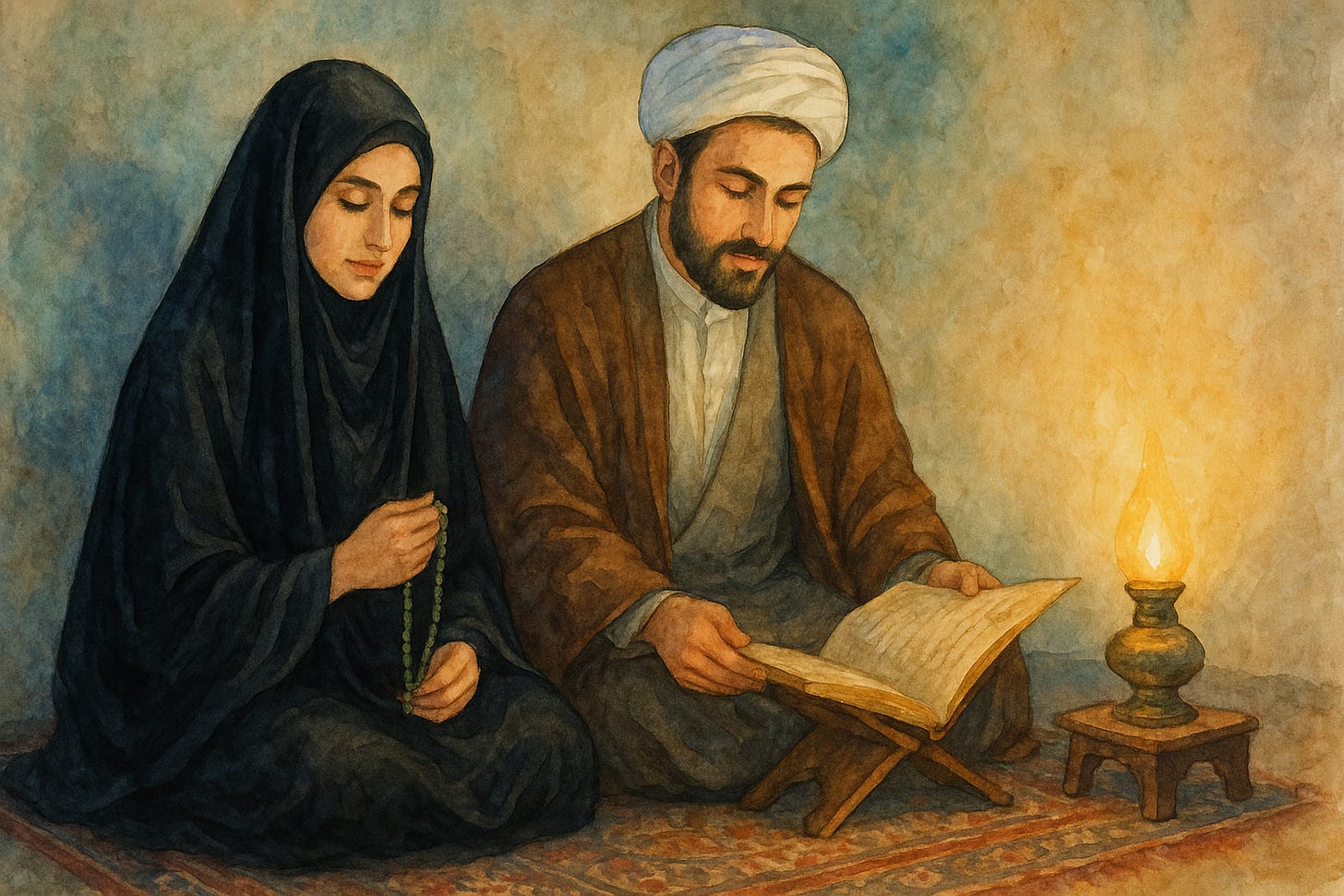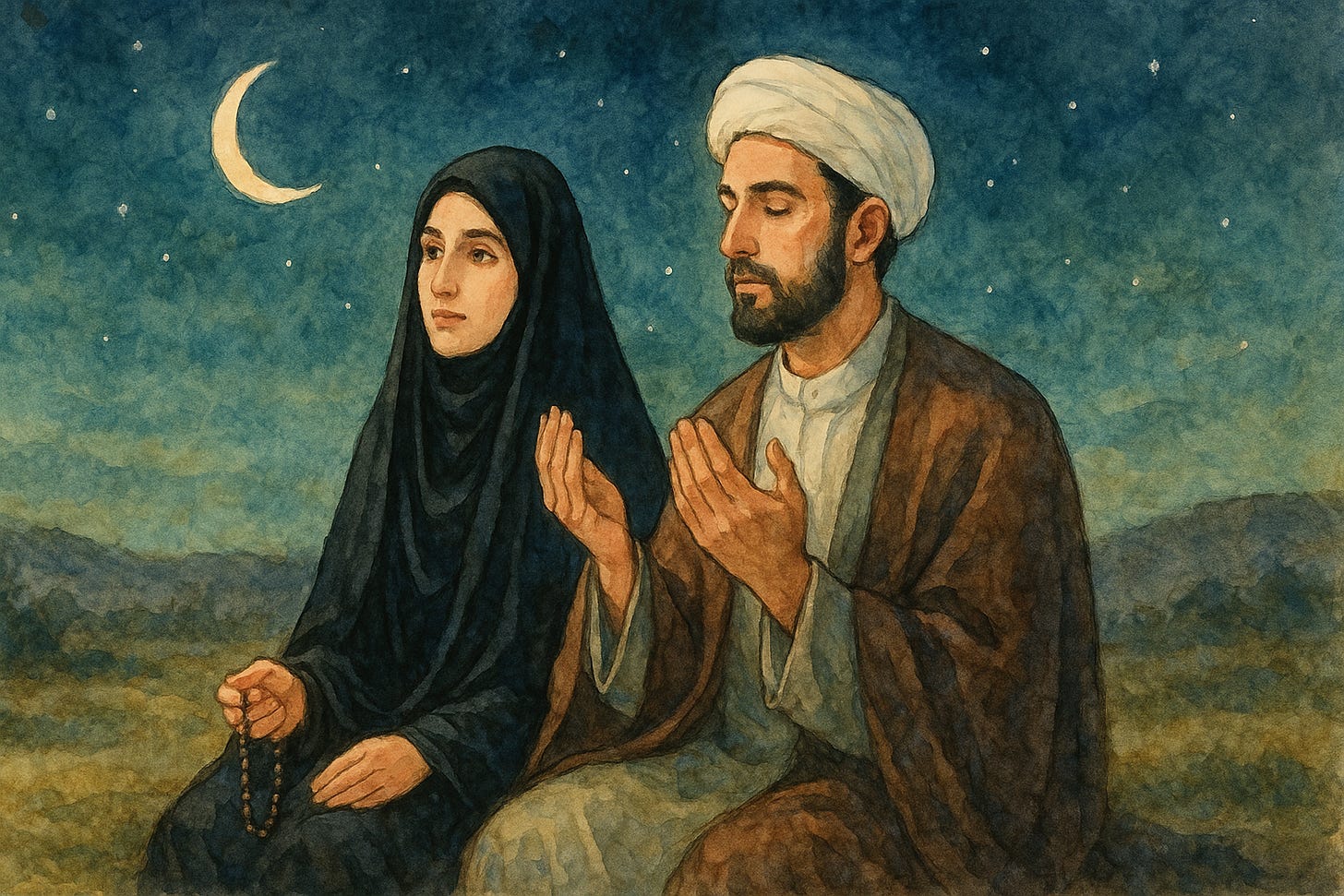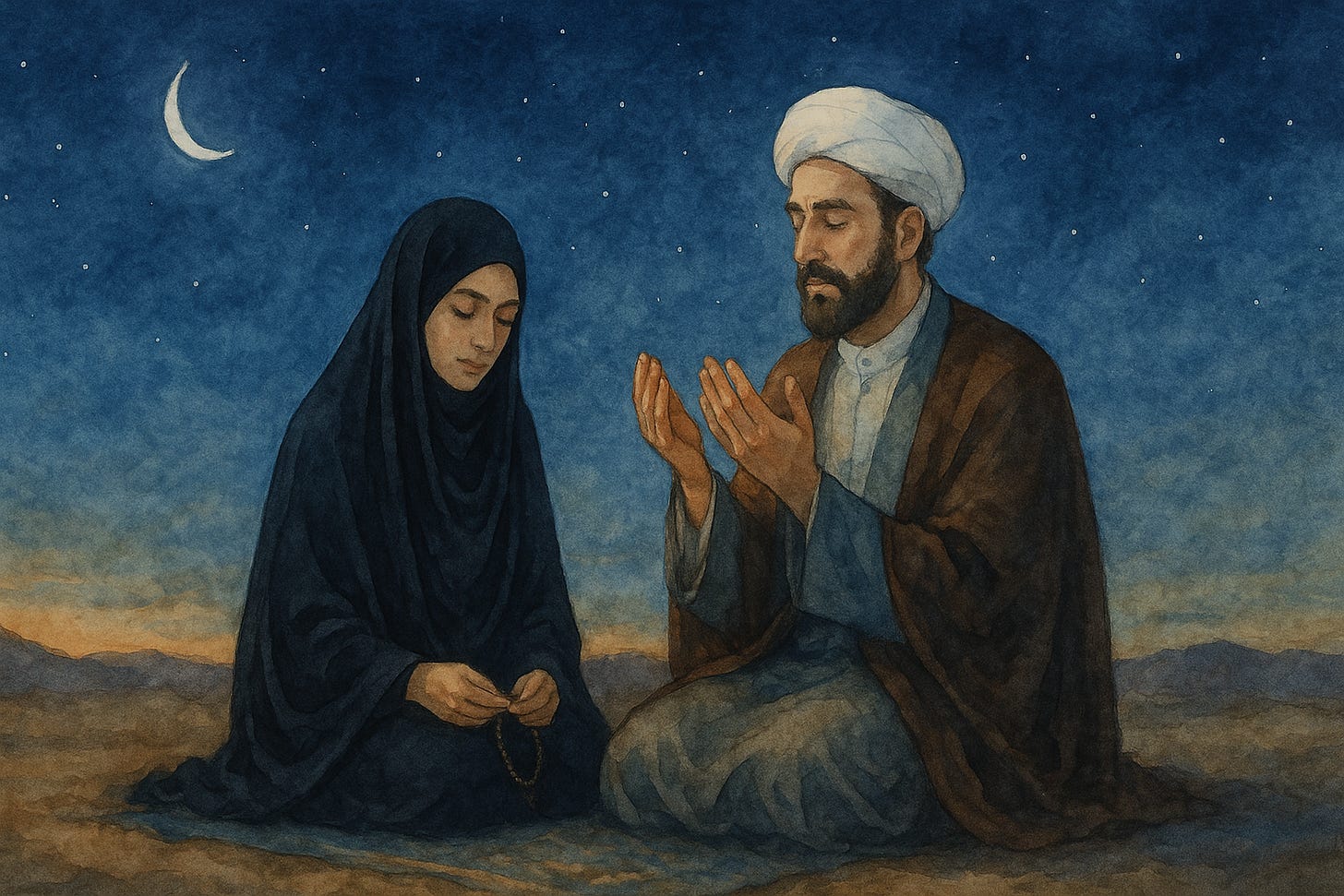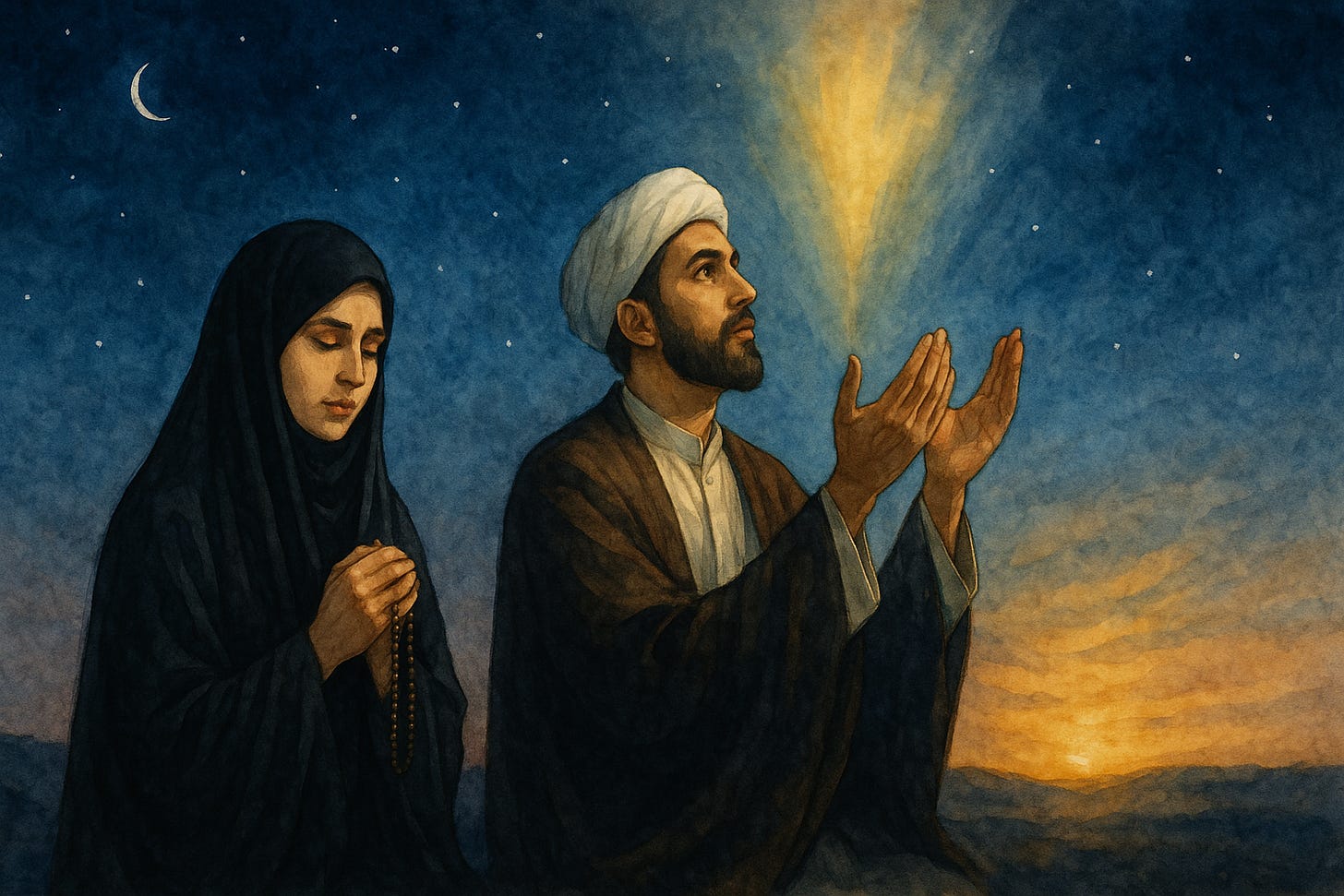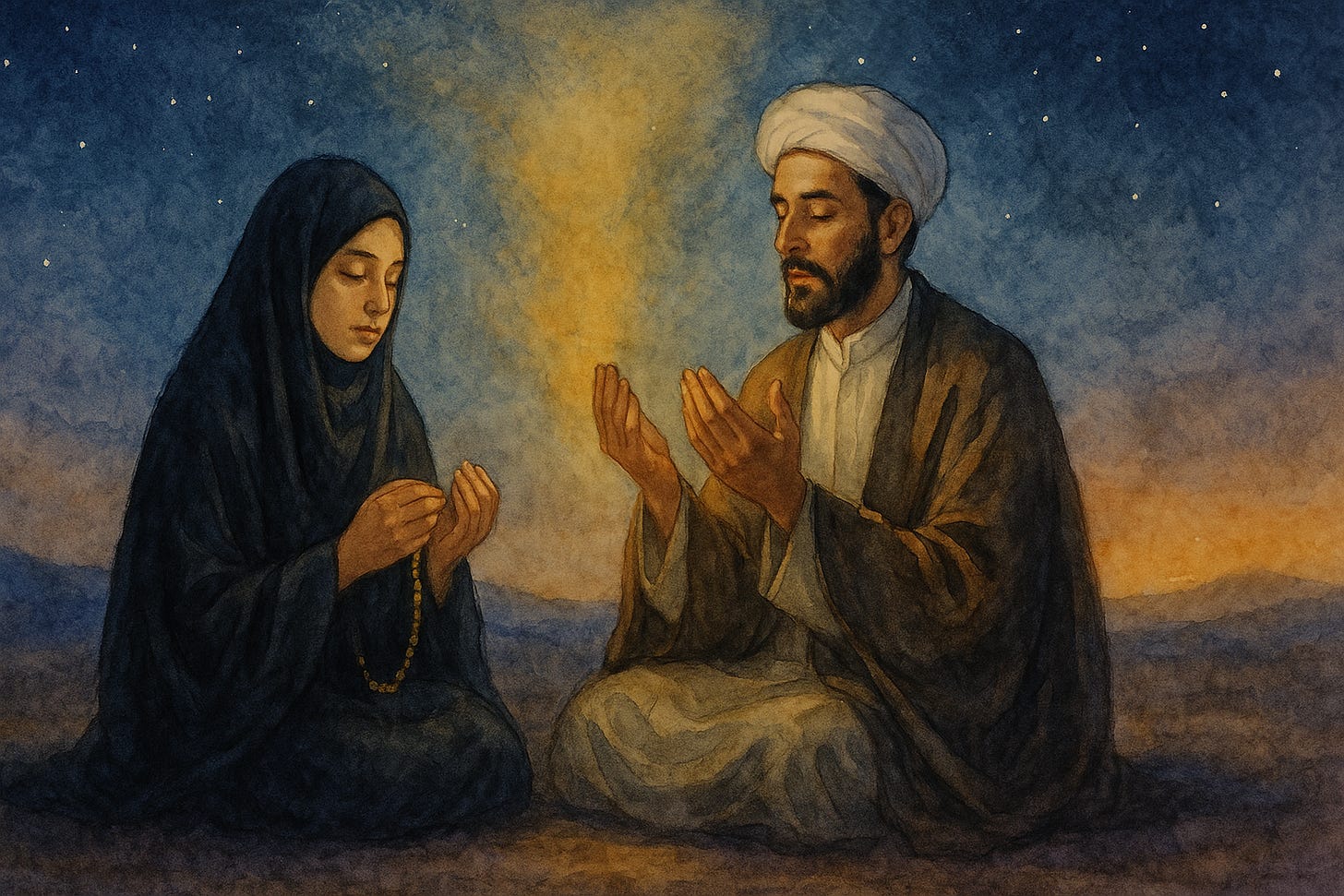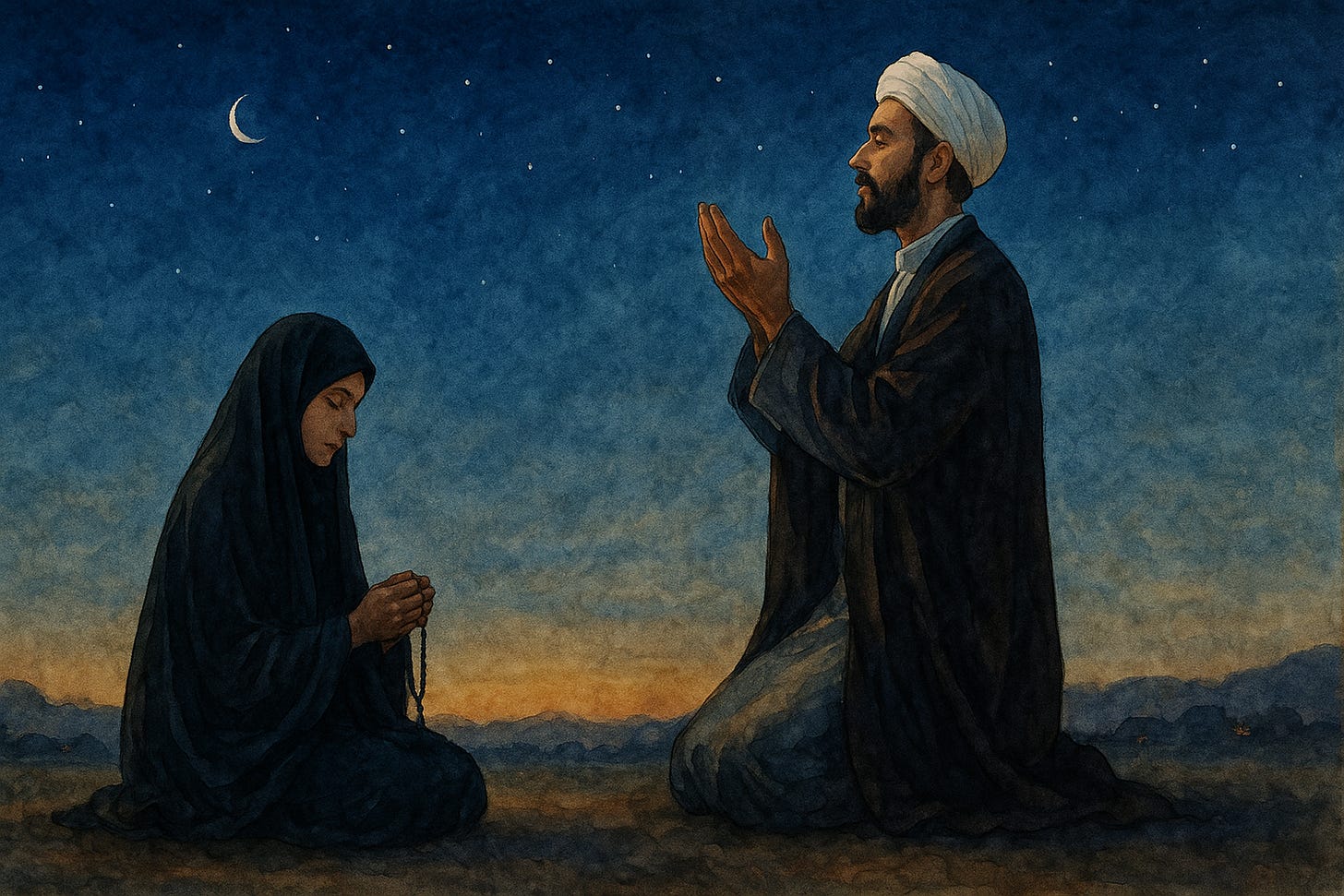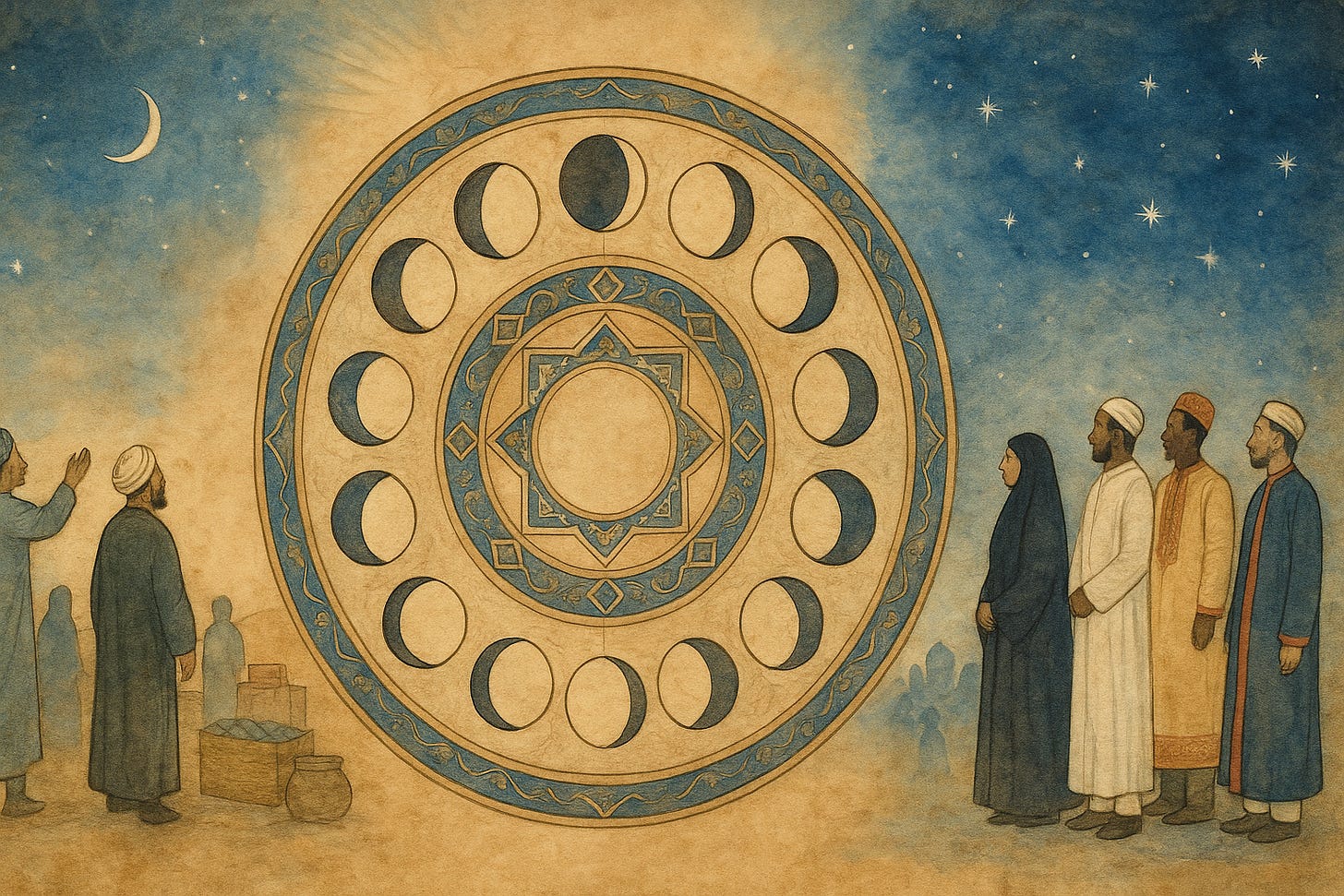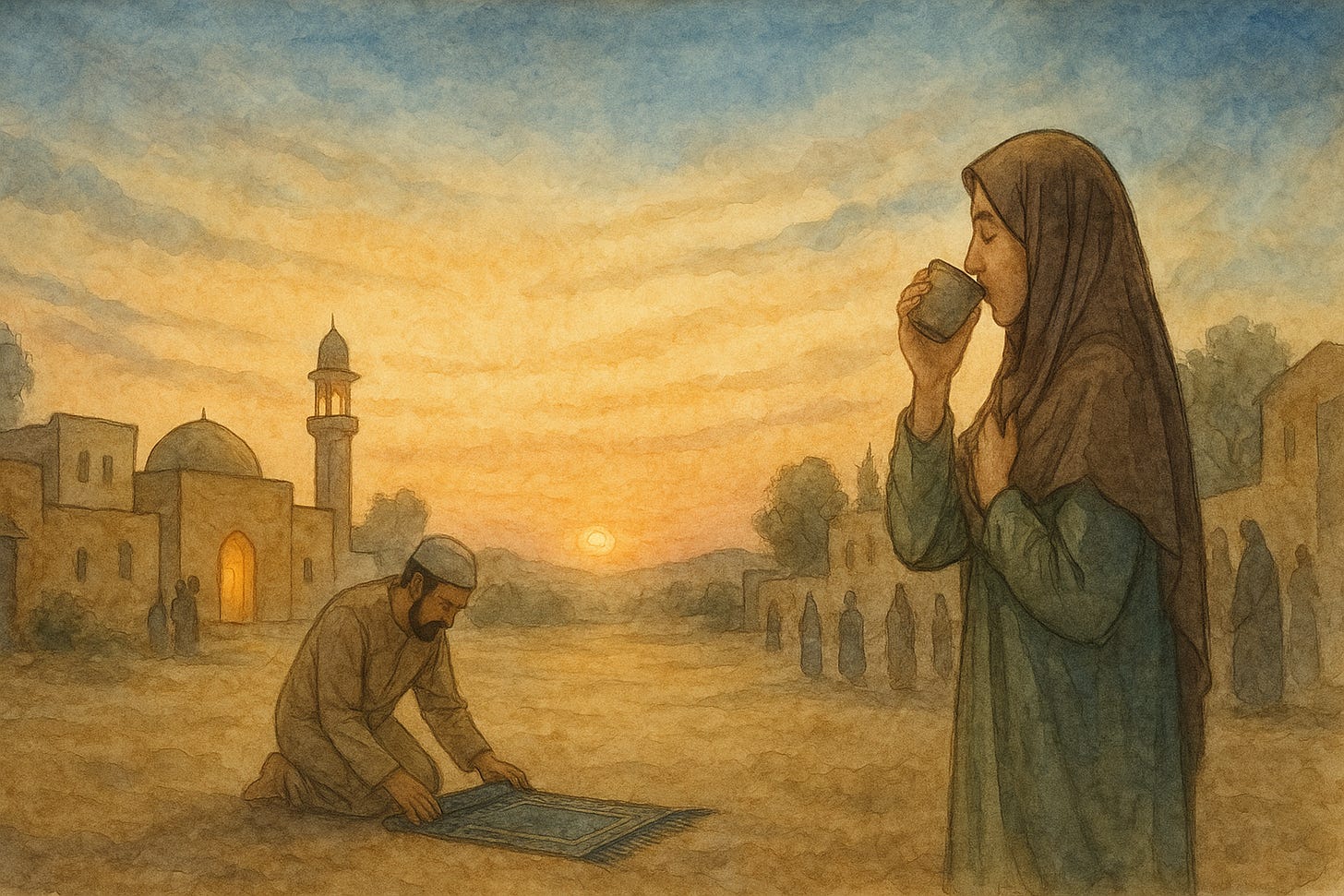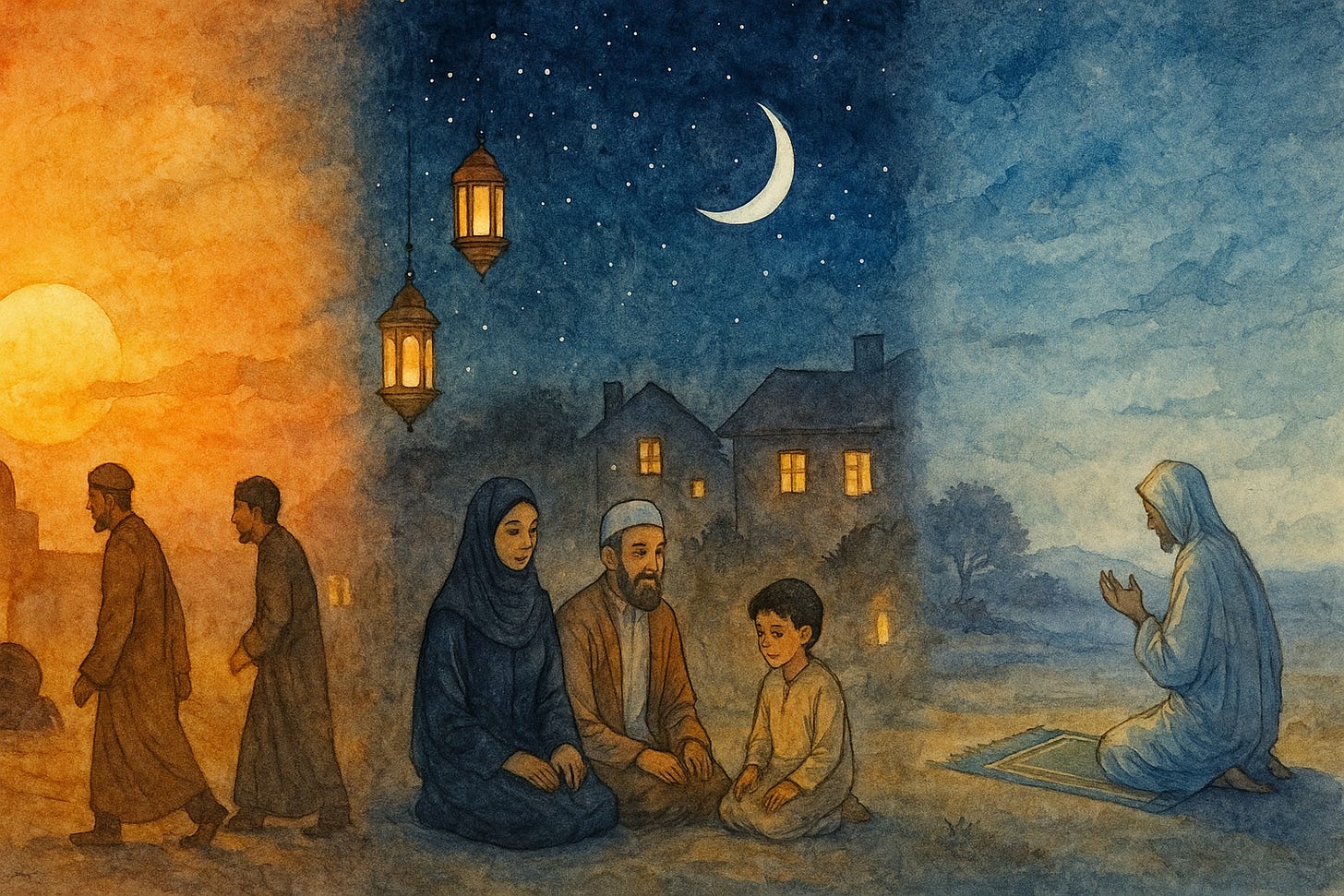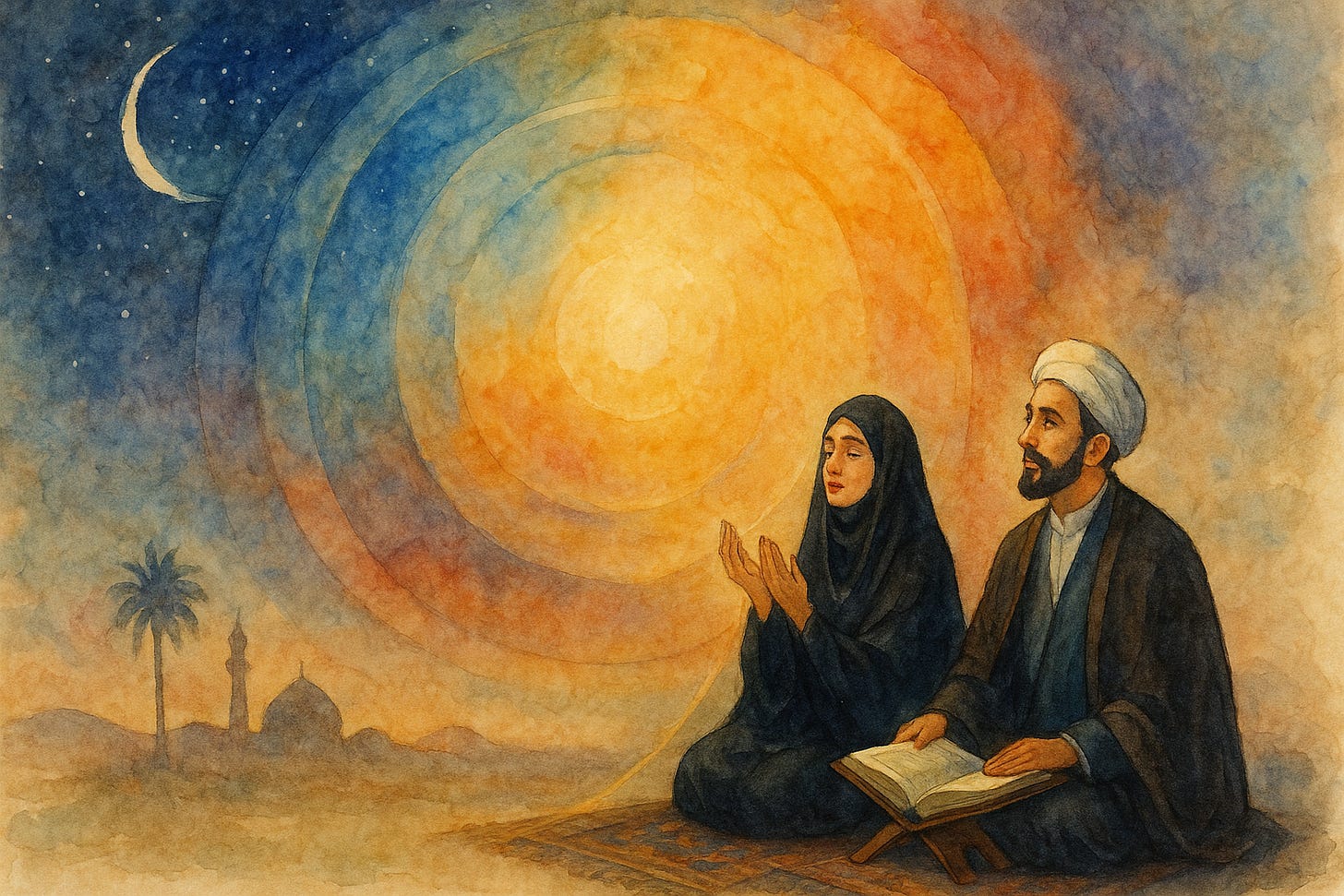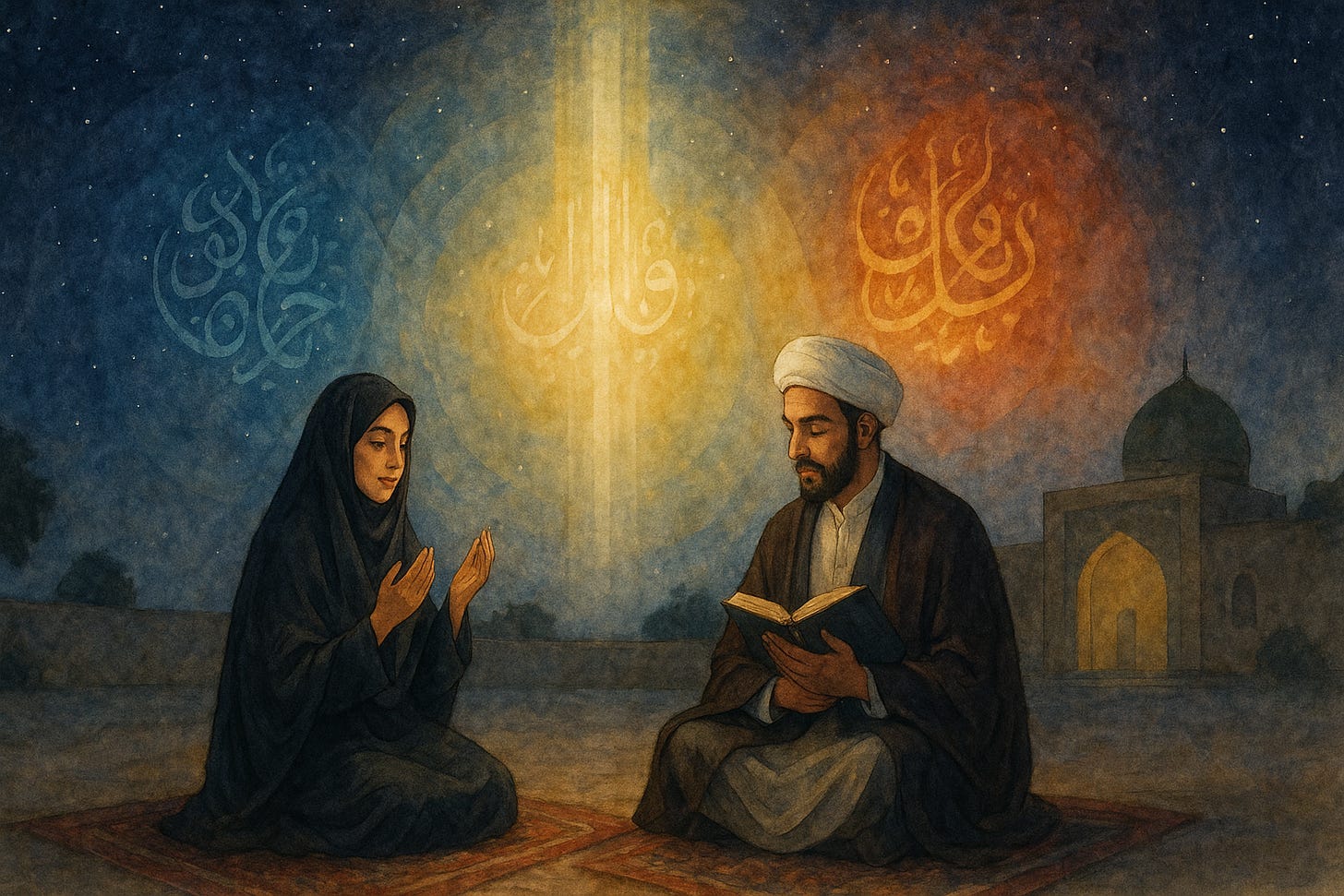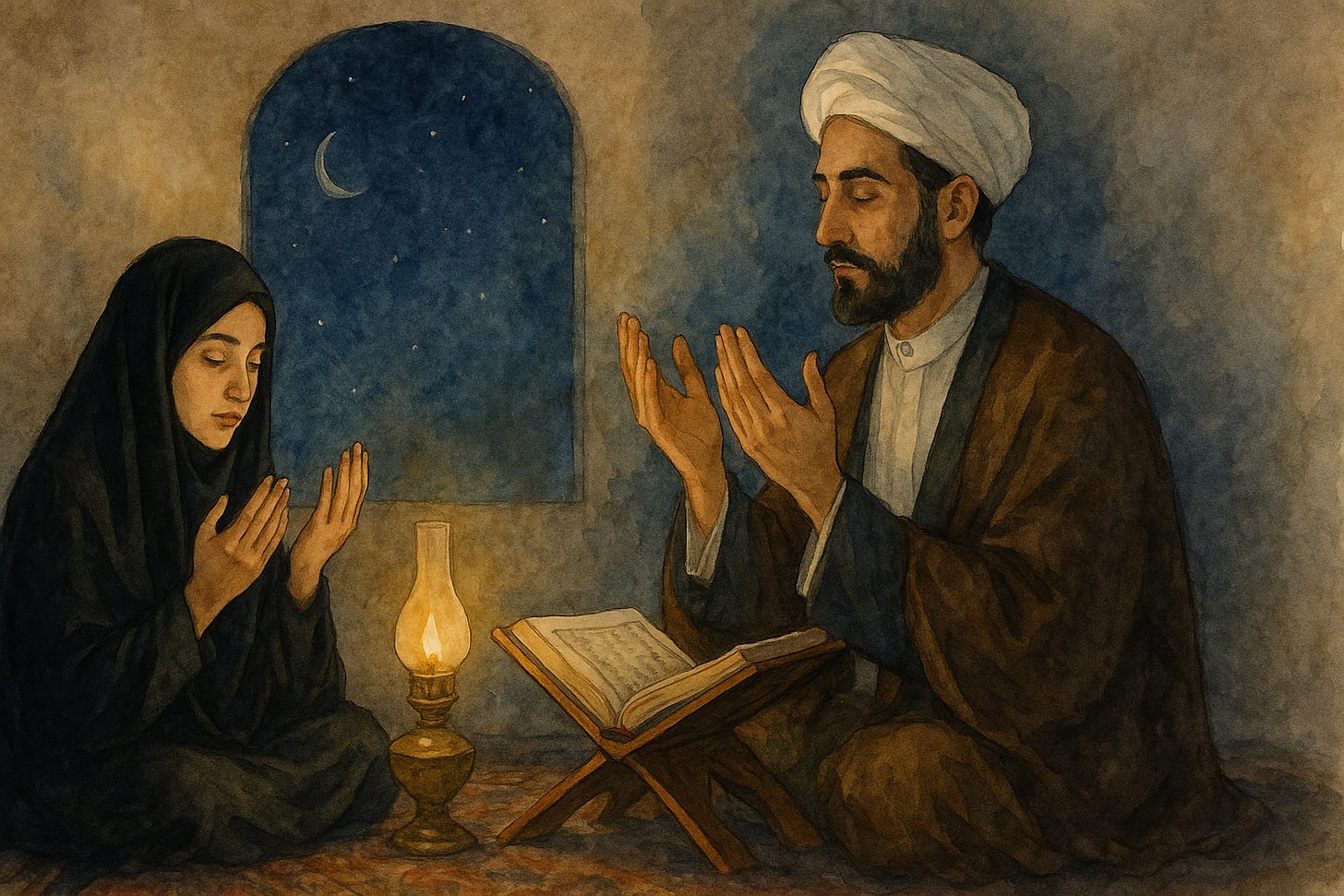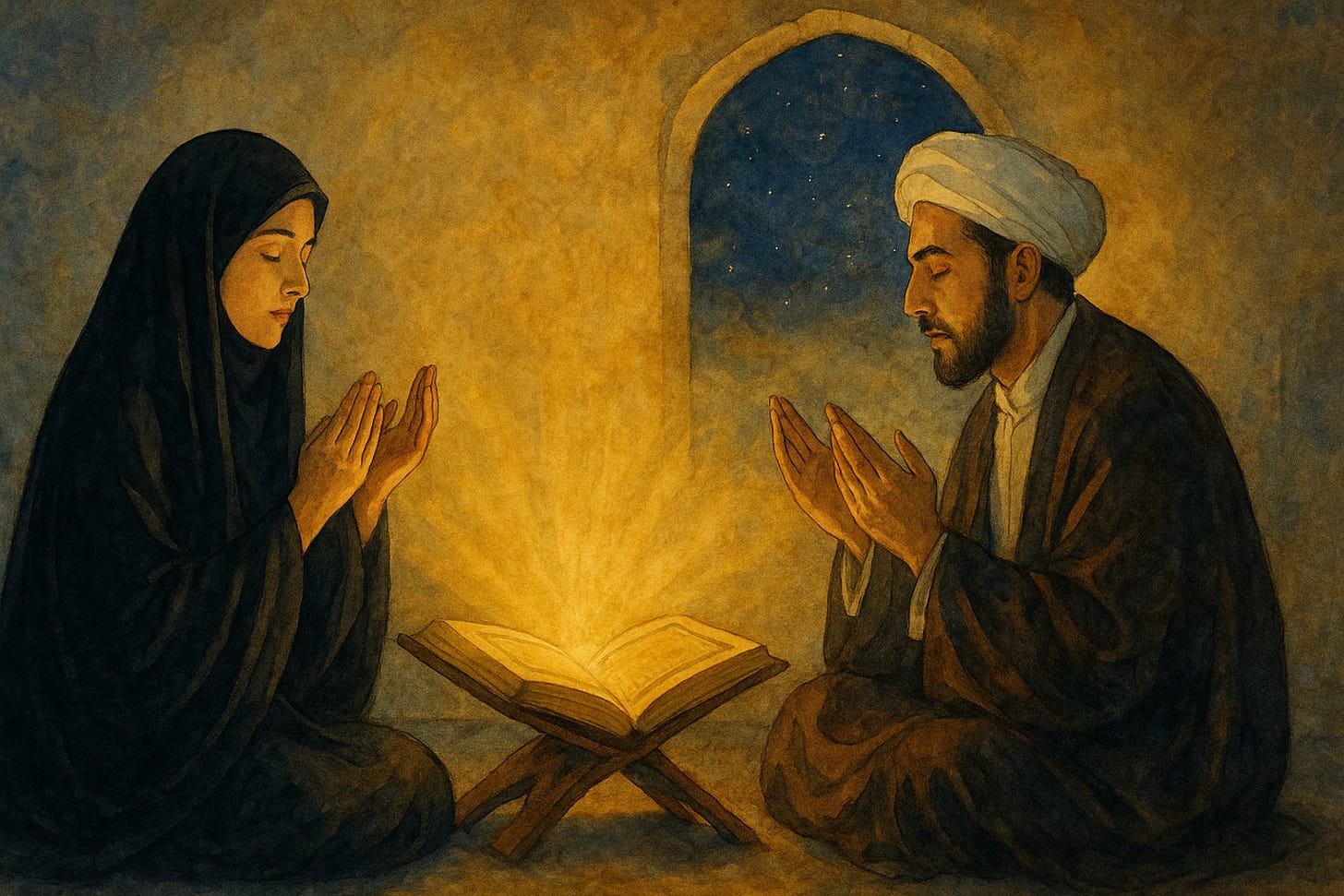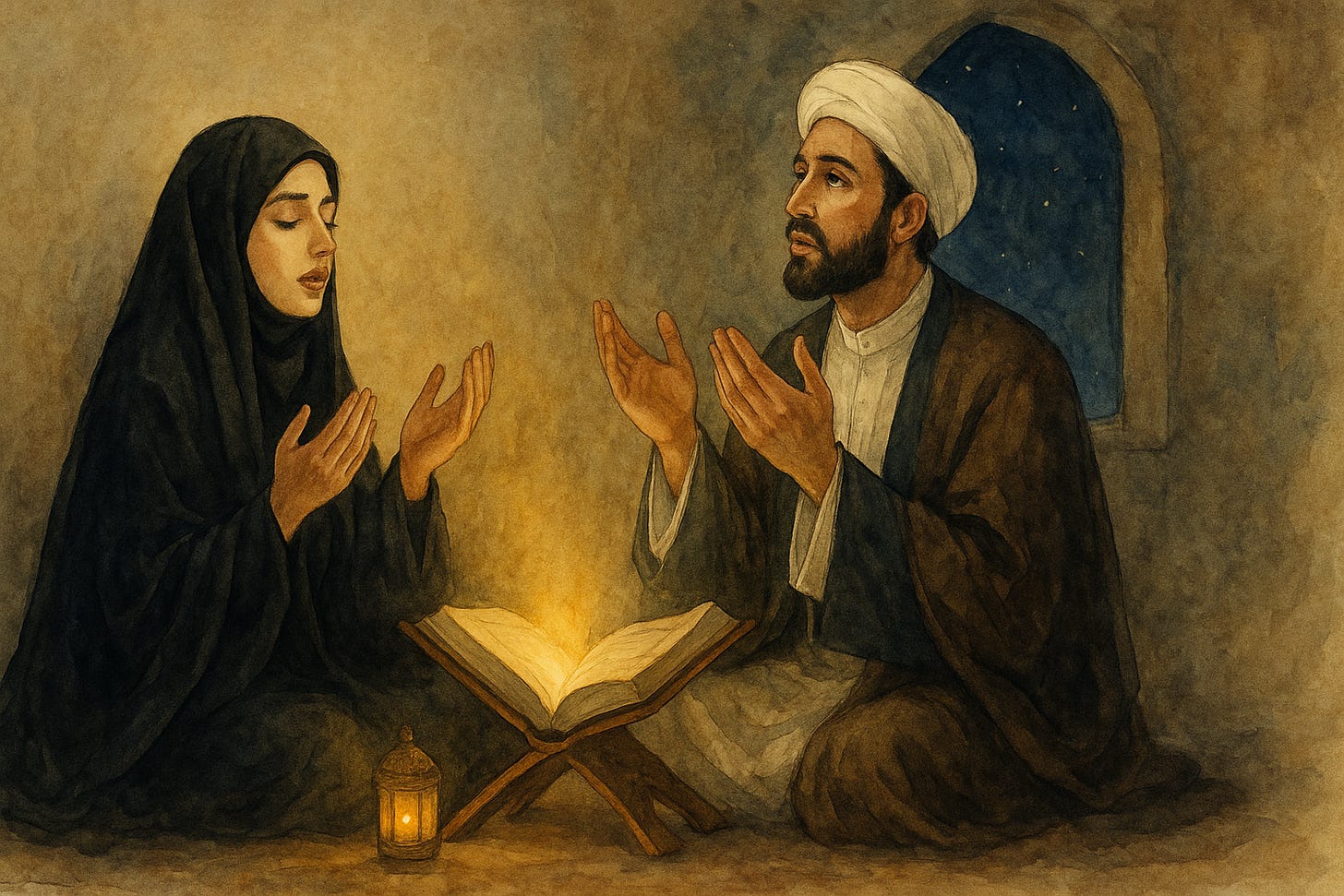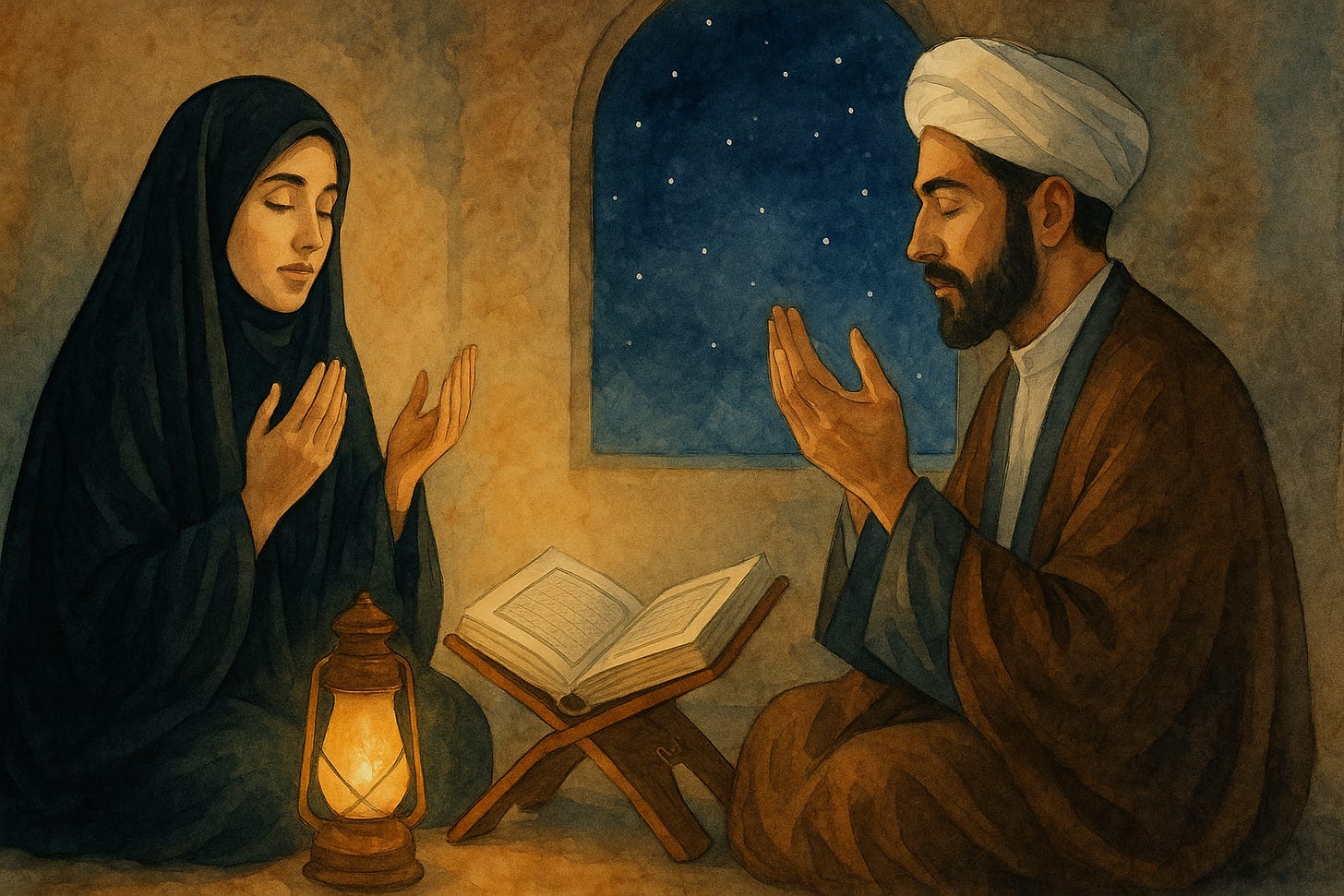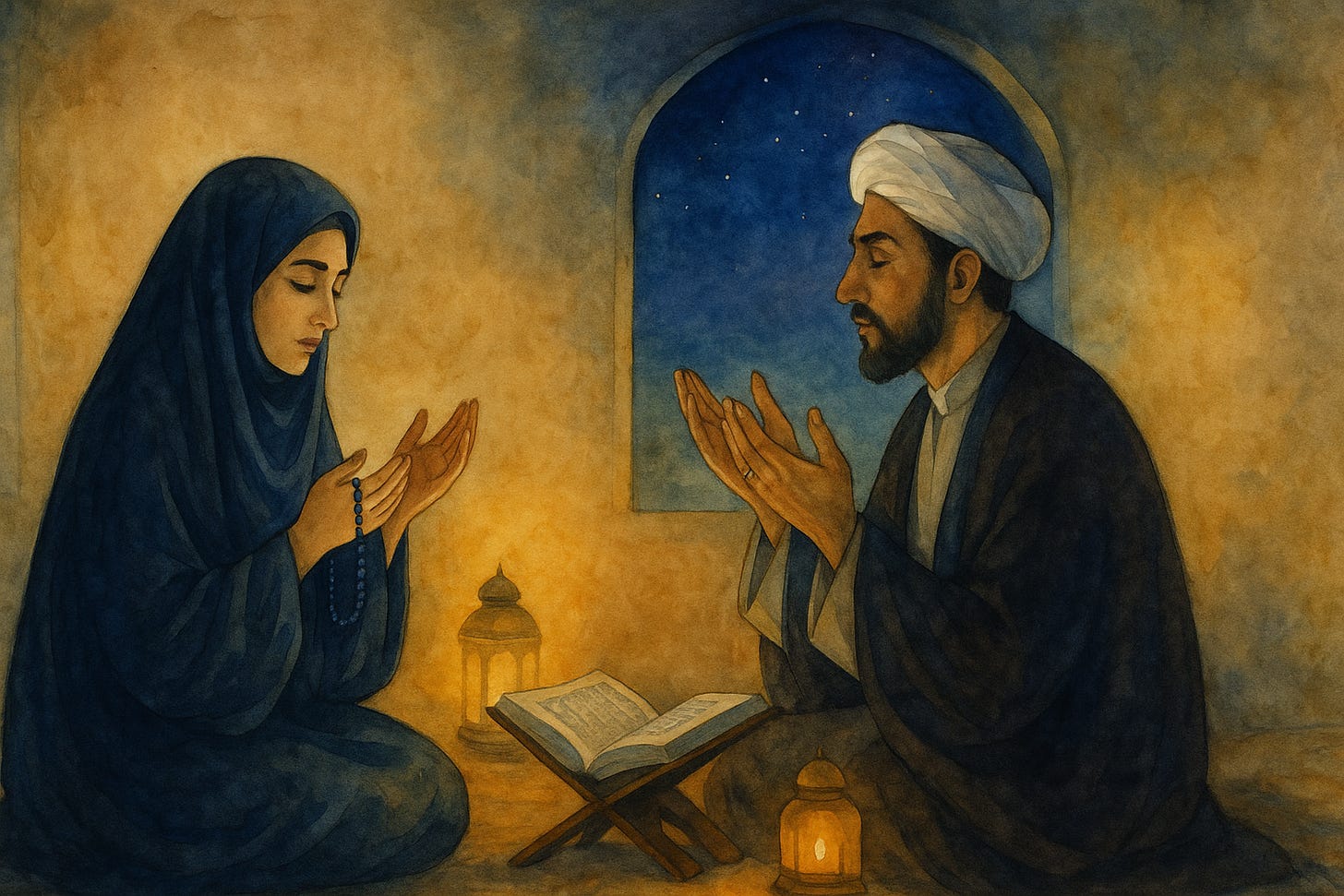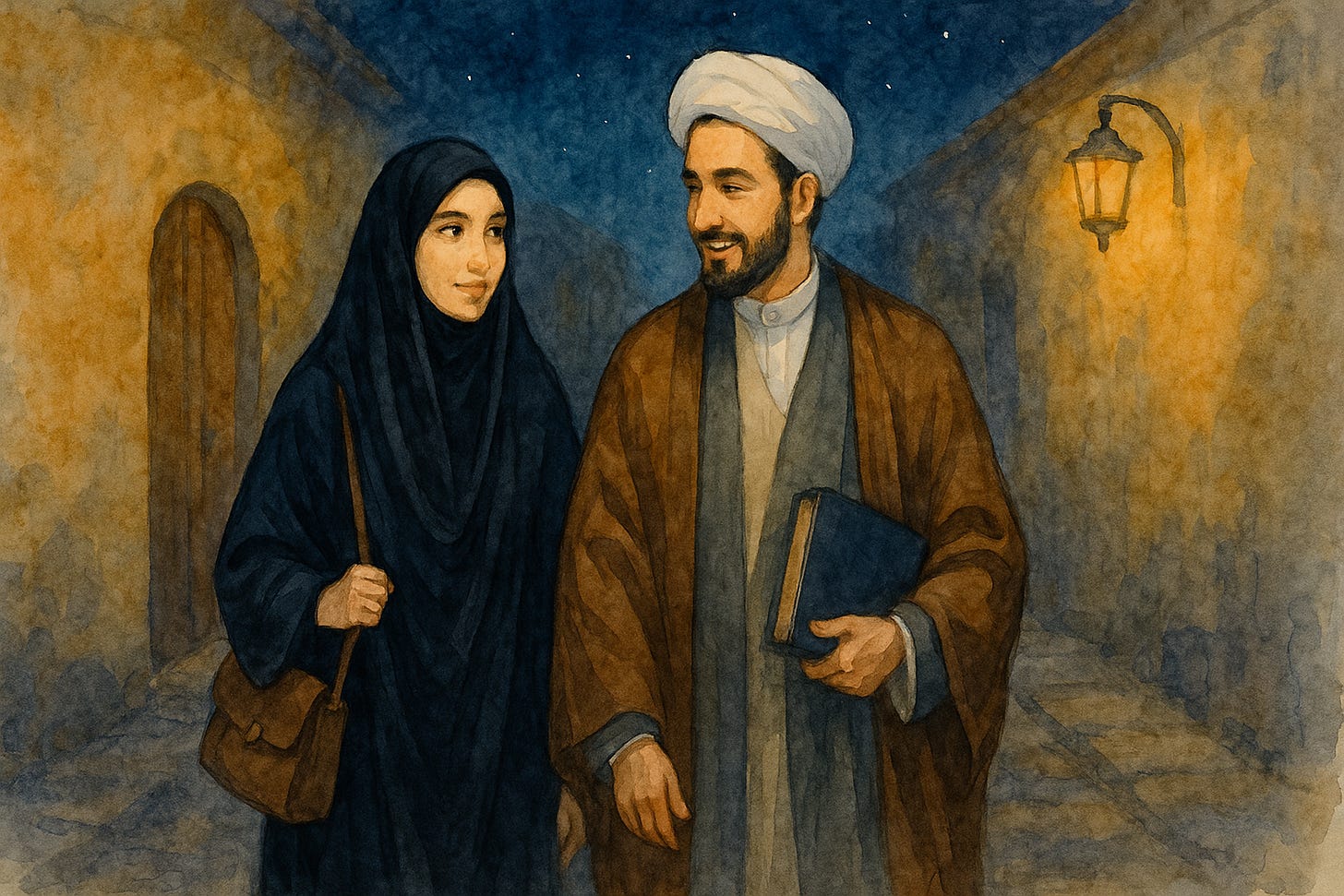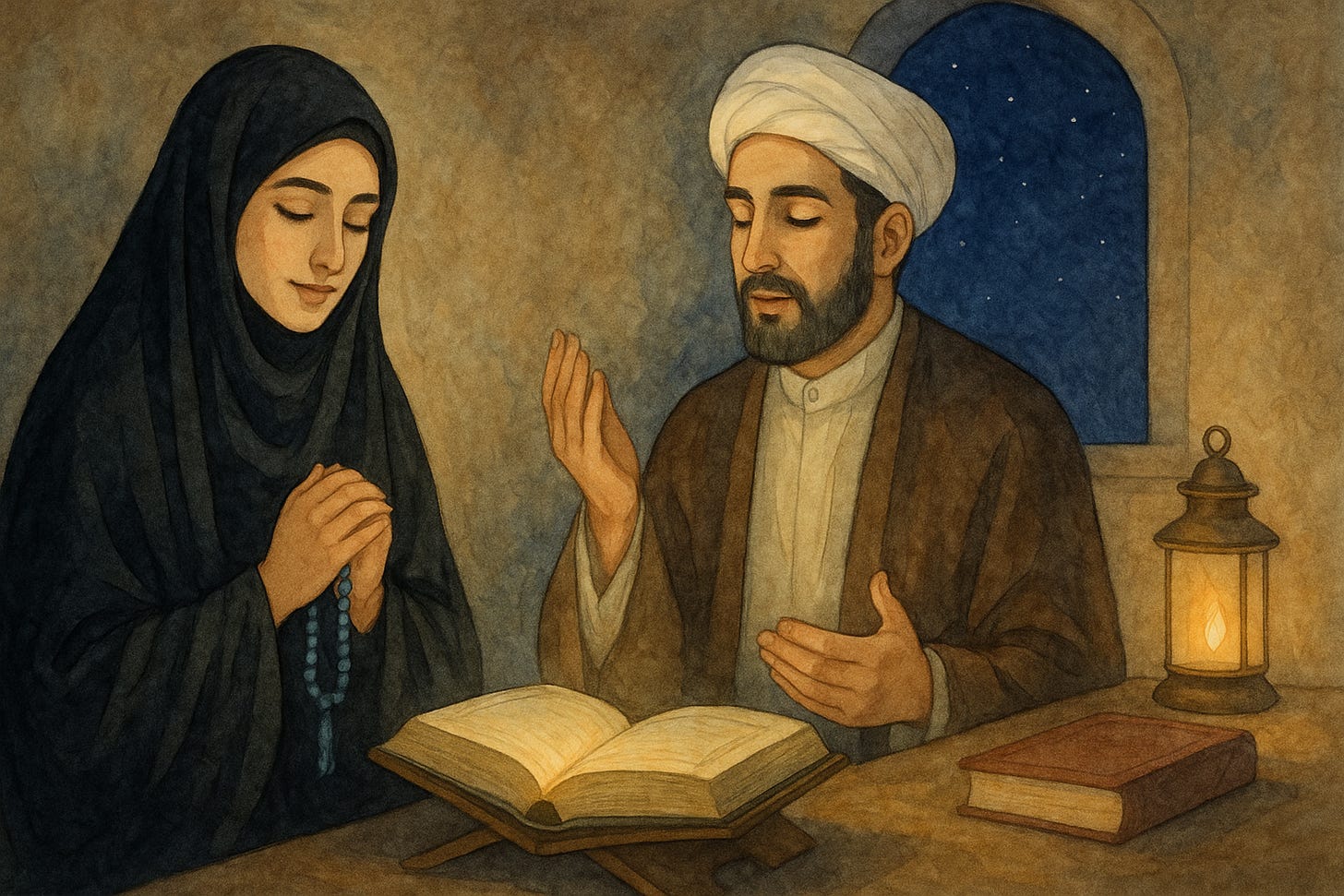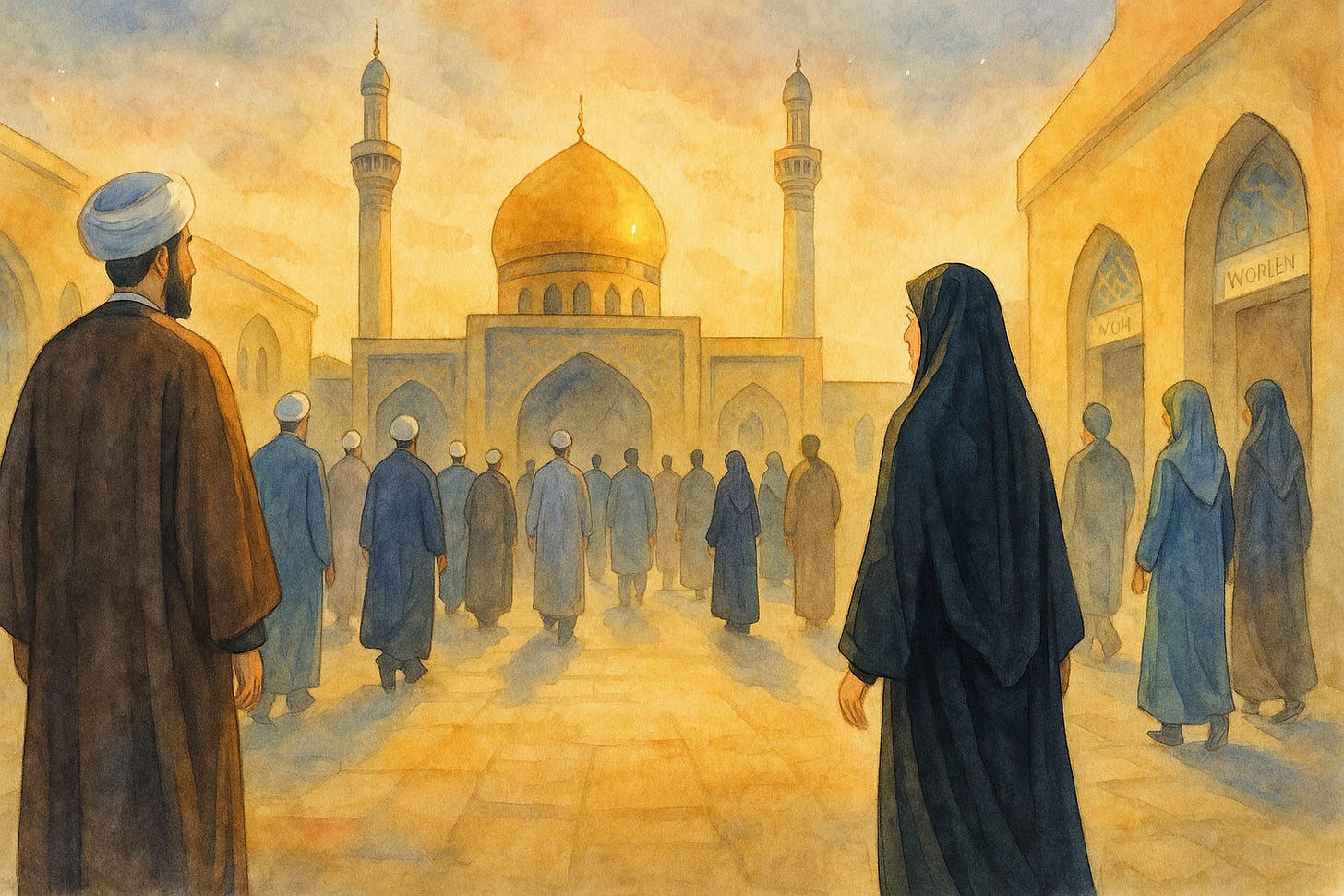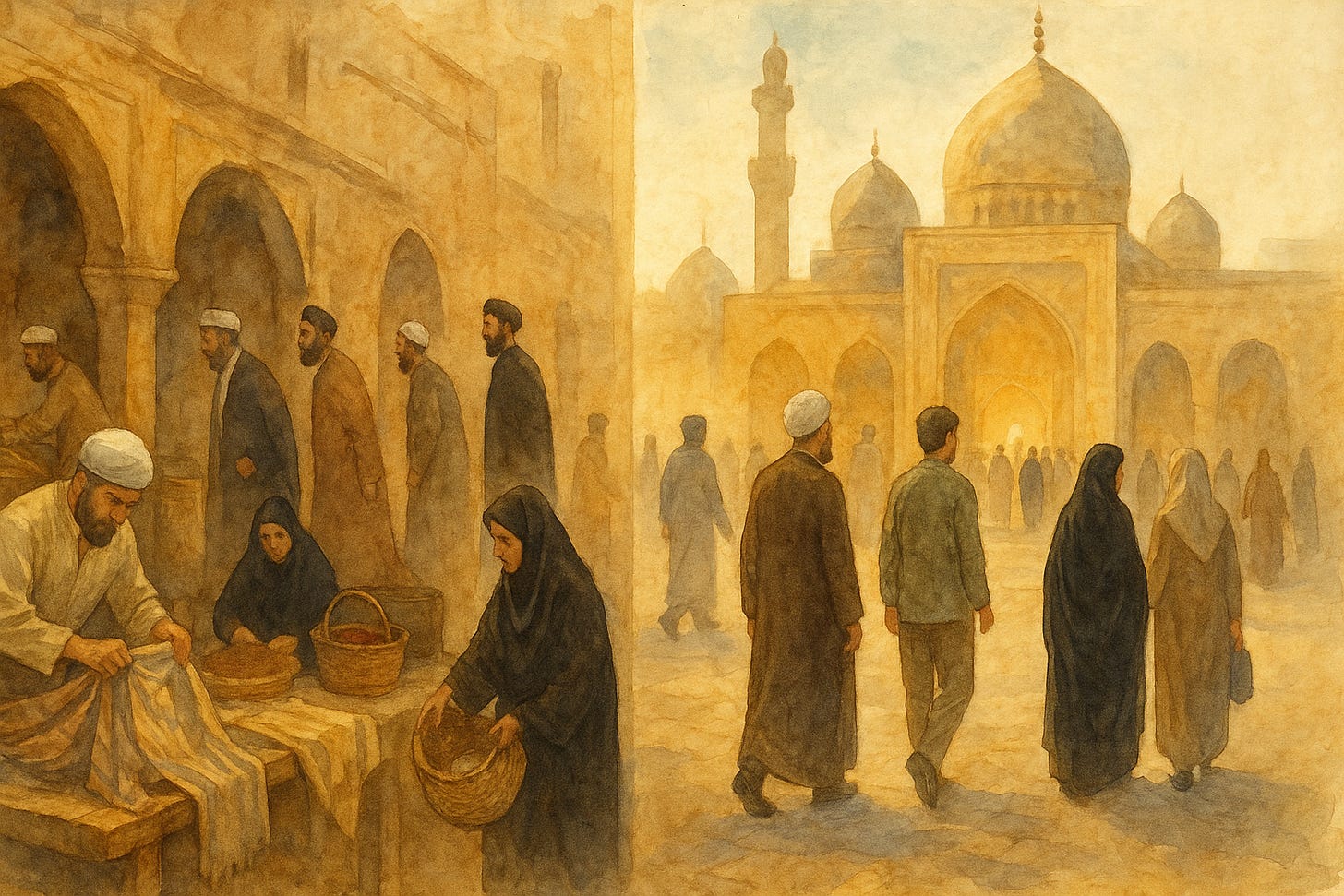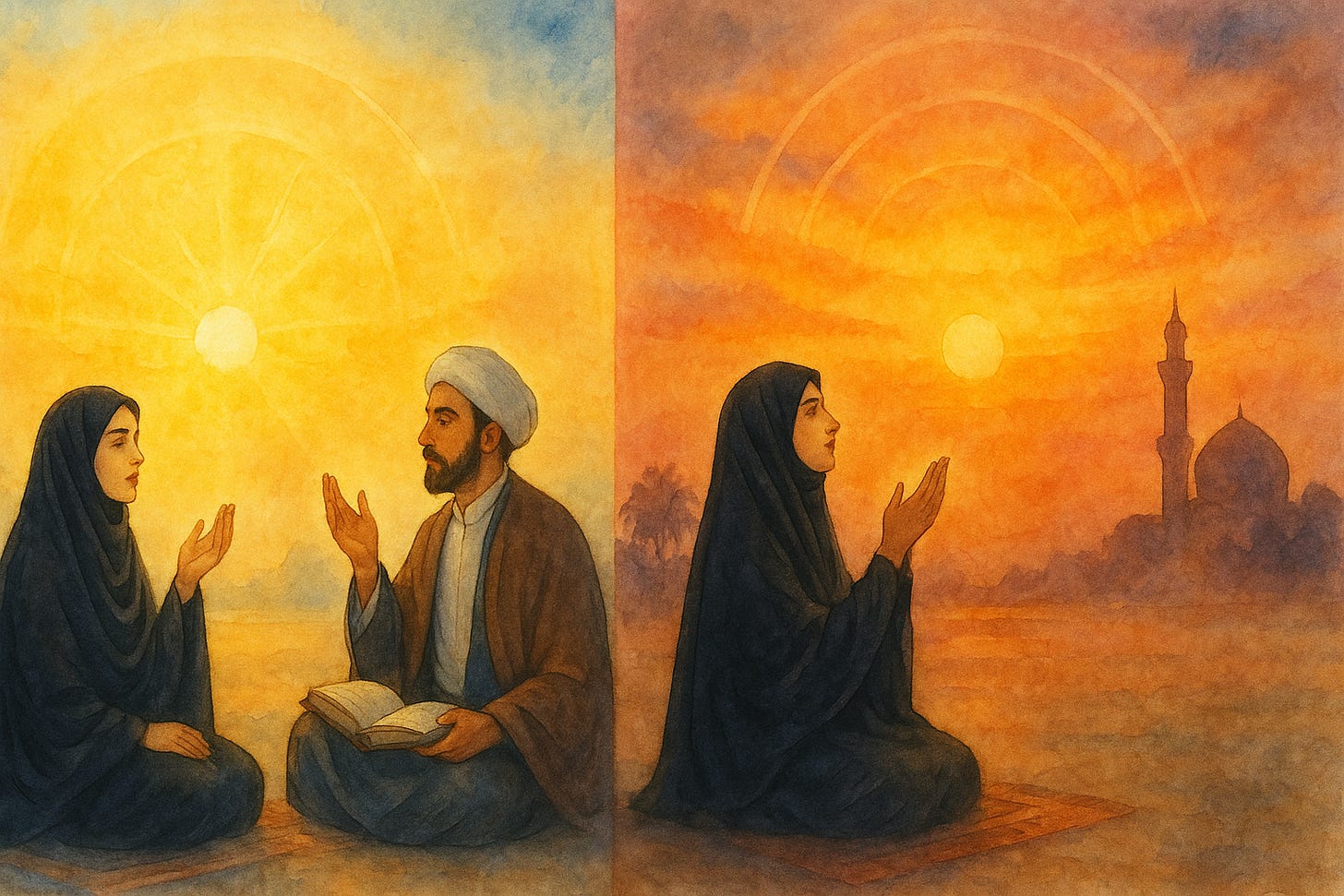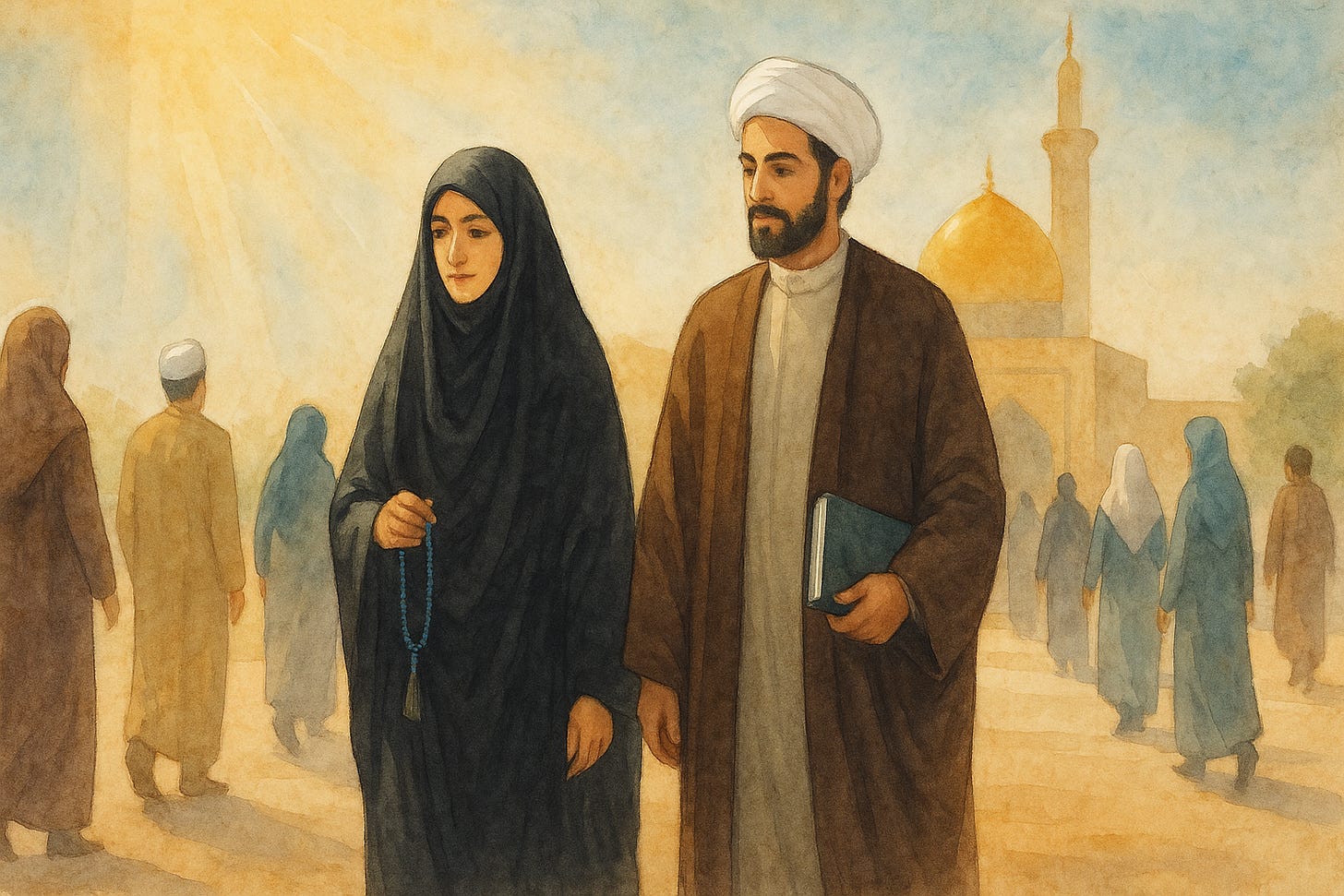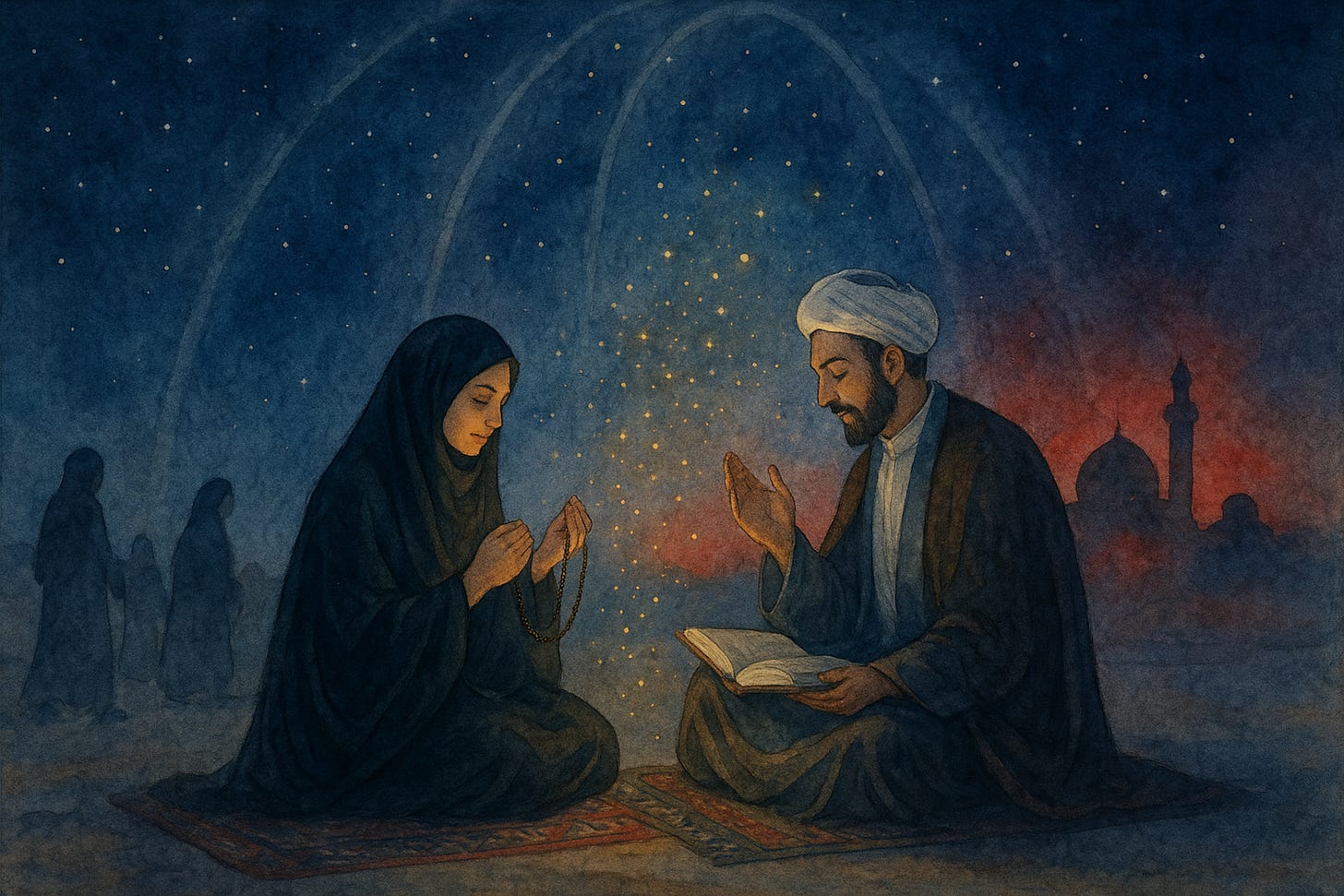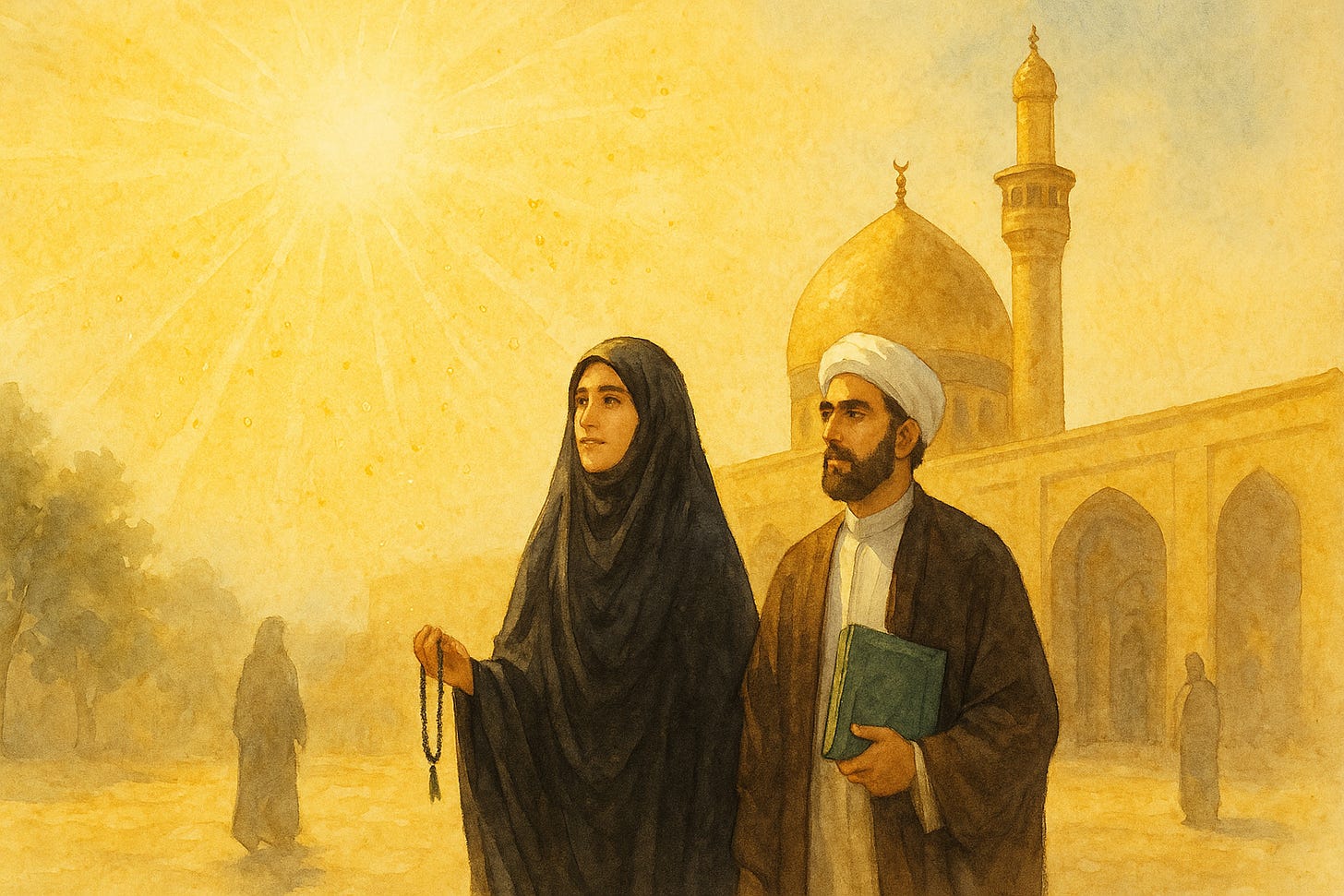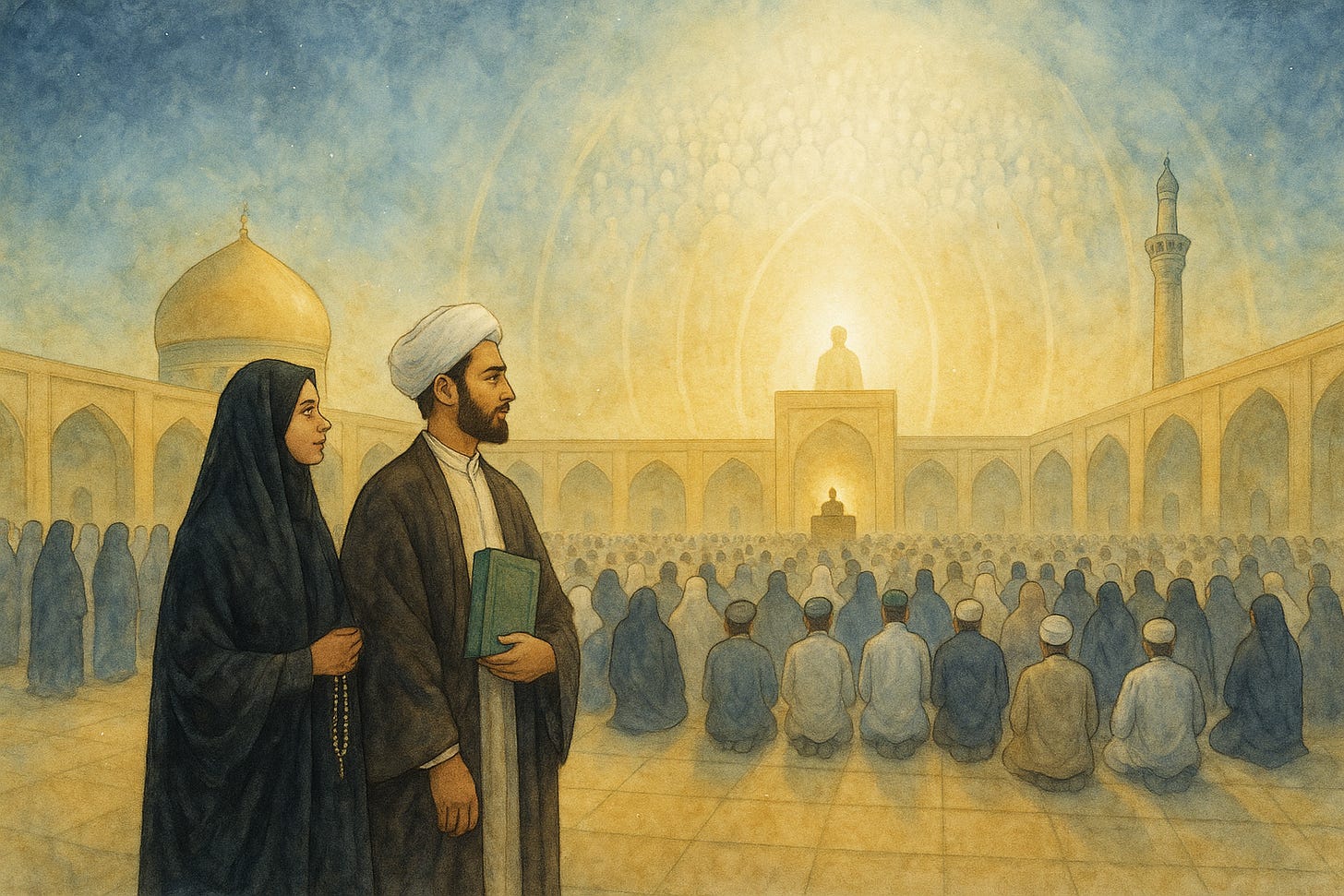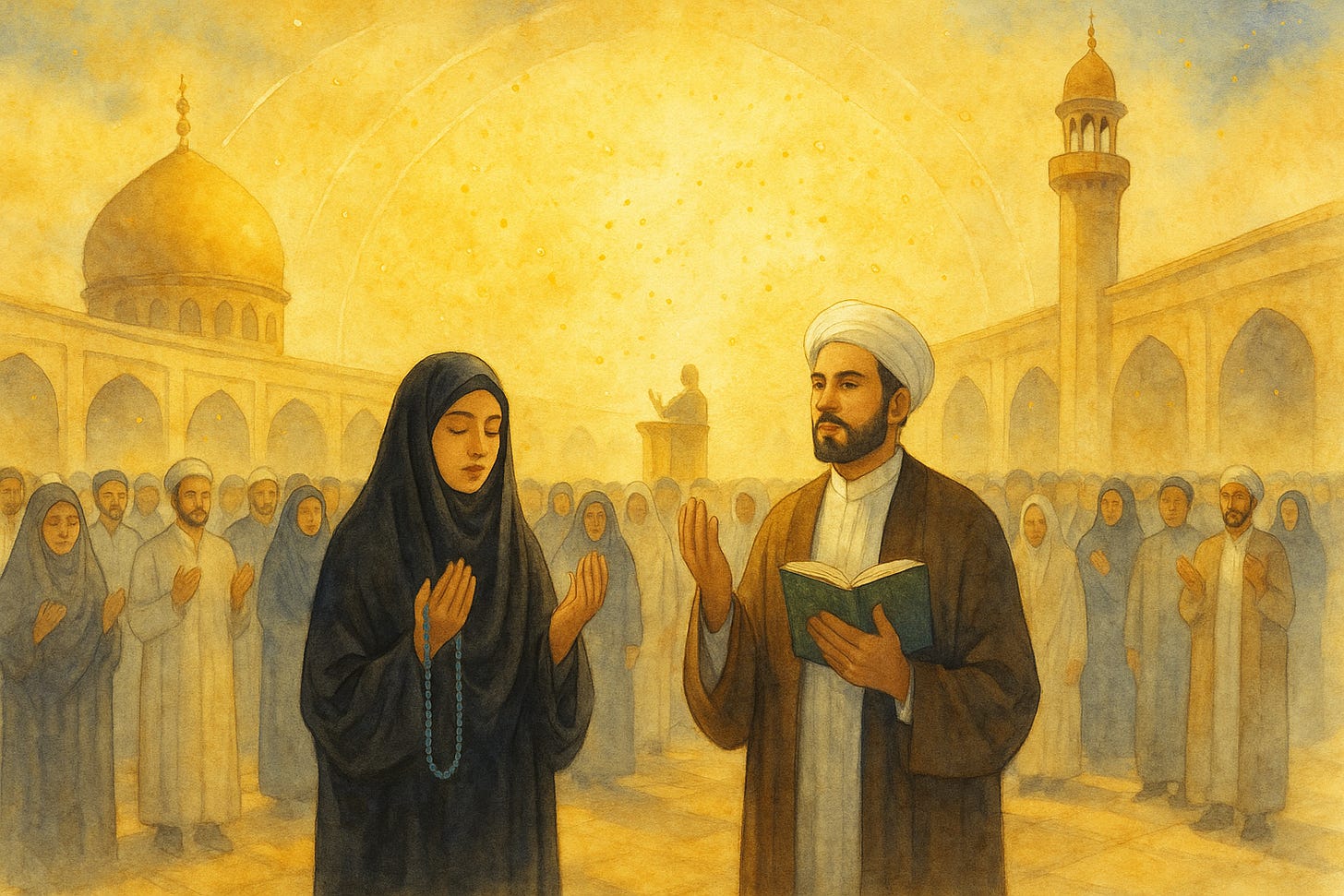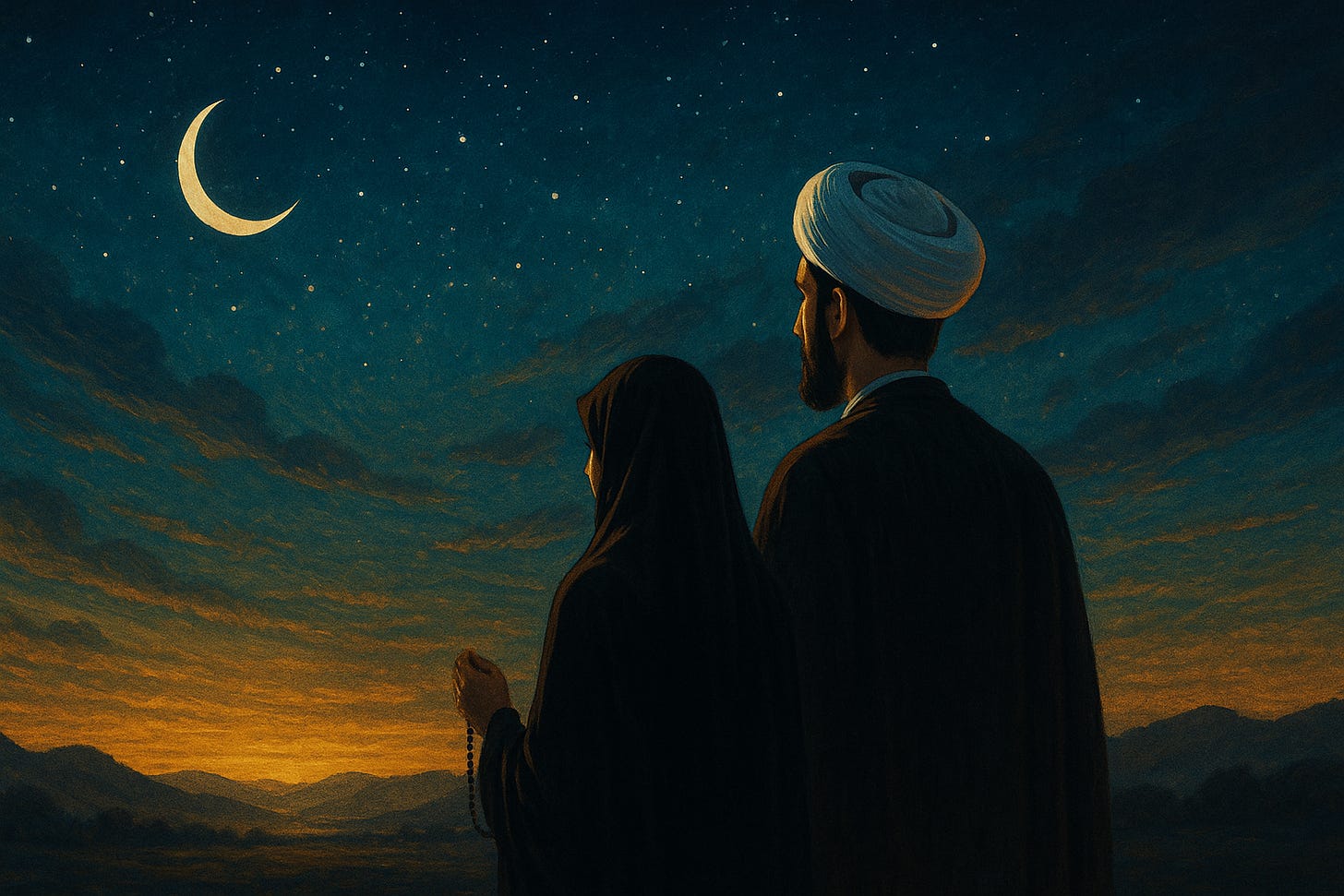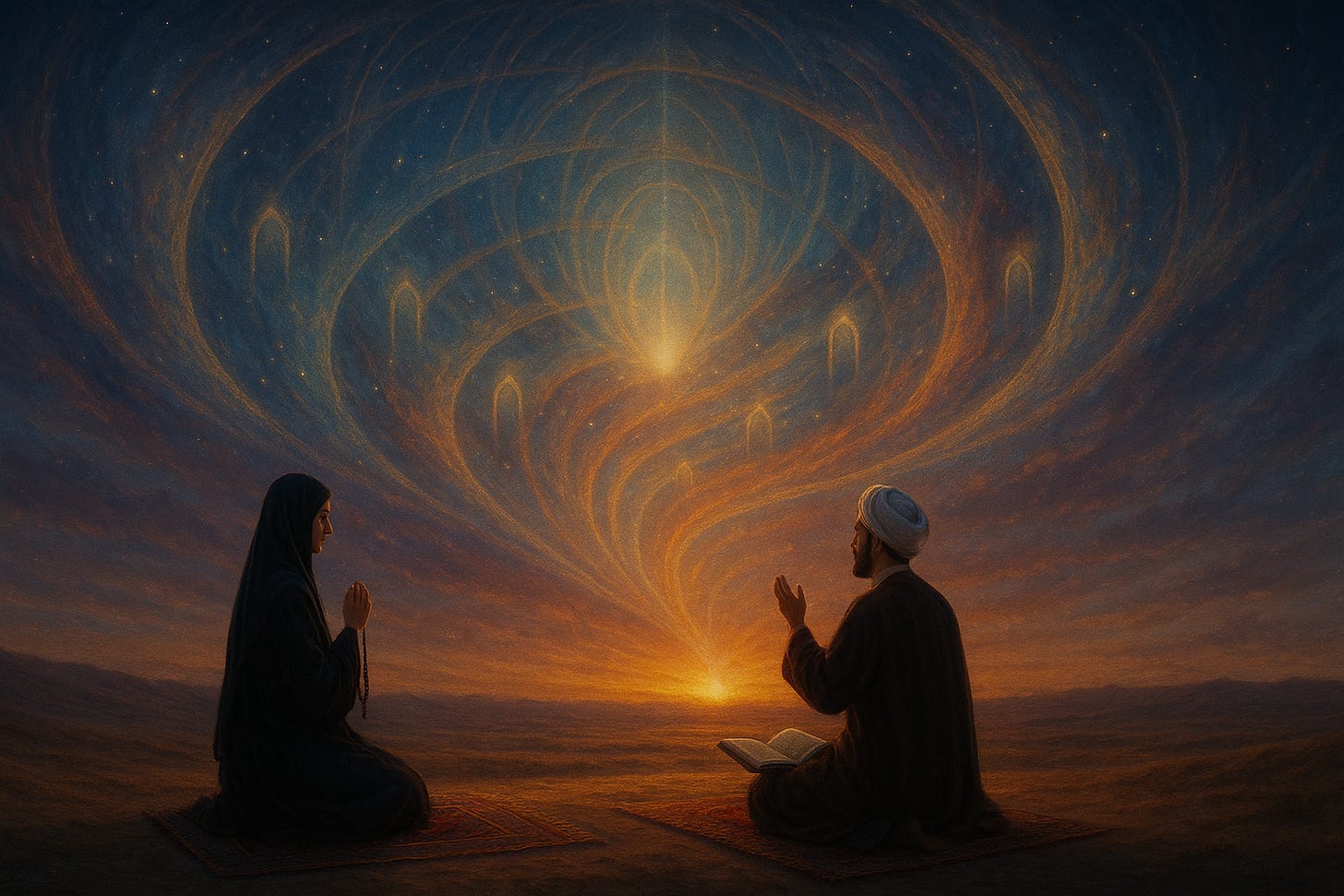[11] The Art of Supplication - The Sacred Windows: The Role of Time - Part 1
A series of discussions based on the book Uddat al-Dai wa Najah as-Saee - The Provision of the Supplicant, and the Triumph of the Seeker by Ibn Fahd al-Hilli on the subject of Supplication and Prayer.
In His Name, the Most High
This is the eleventh part in our series titled “the Art of Supplication”, discussing supplications (dua) and the supplicant and the etiquette of supplicating.
As with other series of discussions we have had, it is strongly recommended that the previous parts are read, before continuing with this one, so as to avoid any confusion or misunderstanding within the subject matter.
The nature of the subject matter, and the style of discussion requires that each part build upon the ones that came before, so it is very strongly recommended that the reader, read the previous parts, prior to consuming this one.
The previous parts in this series can be found here:
Video of the Majlis (Sermon/Lecture)
This write up is a companion to the video majlis (sermon/lecture) found below:
Audio of the Majlis (Sermon/Lecture)
This write up is a companion to the audio recording of the majlis (sermon/lecture) found below:
Recap
The Journey So Far
It has been some weeks since our last session in this series, as our hearts turned to the grief of Ashura and the long shadow of Arbaeen. Tonight, we return to the path we began many months ago — a journey into the art of supplication.
In our first ten gatherings, we laid the foundations:
We began by asking the most basic of questions: What is supplication? We saw that du’a is not a ritual or a recited formula, but the very essence of servitude. It is the rope by which the servant clings to the Lord, and the Lord loves nothing more than to be asked.
We explored the encouragement of du’a in Qur’an and Sunnah, realising that Allah not only commands us to call upon Him, but promises — without condition — that He will respond:
وَإِذَا سَأَلَكَ عِبَادِي عَنِّي فَإِنِّي قَرِيبٌ ۖ أُجِيبُ دَعْوَةَ الدَّاعِ إِذَا دَعَانِ
And when My servants ask you about Me, indeed I am near. I answer the call of the caller when he calls Me.
— Quran, Surah al-Baqarah (the Chapter of the Cow) #2, Verse 186
We confronted the difficult question: Why are some supplications not answered? And we learned that “rejection” is often mercy in disguise; that sometimes the delay, the redirection, or the transformation of our request is itself an answer from the All-Wise.
From there, we opened the treasure chest of benefits.
Over six sessions we discovered that du’a is not only a key to our needs, but:
A weapon of the believer, sharper than steel.
A shield against calamity.
A light that illuminates the path.
A source of contentment for the restless soul.
A means of witnessing God’s mercy.
And a way of being drawn into nearness, until the supplicant realises that the very act of calling is the answer they sought.
Each of these discussions built a philosophy: that supplication is the breath of wilayah, the language of dependence, and the truest expression of the human condition before God.
And now, as we resume, we turn to the next stage.
Up to now, we have explored the why of dua. Tonight, and in the coming weeks, we will explore the how: the sacred conditions and windows that the Quran, the Prophet, and the Ahl al-Bayt have taught us.
We begin with the most visible of these: the sacred windows of time and place — those divinely appointed moments and locations where the heavens are opened wider, where mercy descends more abundantly, and where the call of the servant rises with greater force.
Introduction to Sacred Windows
The Quran points us to the existence of sacred times where the servant becomes more receptive to divine mercy. Among them is the hour before dawn:
وَبِالْأَسْحَارِ هُمْ يَسْتَغْفِرُونَ
And at dawn they would seek forgiveness.
— Quran, Surah al-Dhariyat (The Chapter of the Winds That Disperse) #51, Verse 18
A single verse, yet it reveals a principle repeated throughout revelation:
God has chosen moments and places where the heart of the believer is more readily softened, where the veils are thinned, and where His mercy descends more abundantly.
It is not that God is absent in other times or other places. Imam Ali (peace be upon him) describes this truth in his opening sermon of Nahjul Balagha:
مَعَ كُلِّ شَيْءٍ لَا بِمُقَارَنَةٍ، وَغَيْرُ كُلِّ شَيْءٍ لَا بِمُزَايَلَةٍ
He is with everything, not by association, and other than everything, not by separation.
— Nahjul Balagha, Sermon 1
God is near at every moment.
Yet it is the human heart that fluctuates — veiled at times, awakened at others. The mercy of sacred time and place is that God has scattered opportunities where the servant is more easily moved, where nearness becomes accessible.
Shaykh Ahmad ibn Fahd al-Hilli in Uddat al-Da’i wa Najah al-Sa’i dedicates entire subsections to the time of dua and the place of dua. He writes:
فَالْعَبْدُ يَجِبُ أَنْ يَغْتَنِمَ أَوْقَاتَ الْإِجَابَةِ وَأَمَاكِنَهَا، فَإِنَّهَا مَوَاضِعُ تَنَزُّلِ الرَّحْمَةِ وَمَحَالُّ إِسْعَافِ الْمَلَكُوتِ.
The servant must seize the times and places of response, for they are the points of descent of mercy and the stations of assistance from the realm of the unseen.
— Ibn Fahd al-Hilli, Uddat al-Dai wa Najah as-Saee, Chapter Two, Section on Time of Supplication
Imam Khomeini, may God rest his pure soul, reflects on this principle in his Adab al-Salat:
بدان که از آداب مهمه قلبیه عبادات، خصوصاً عبادات ذکریه، حضور قلب است. و آن عبارت است از آن که قلب انسان در وقت عبادت از توجه به غیر حق منصرف باشد و متوجه به حق شود، و از غیر او اعراض کند و به او اقبال نماید. و این از مهمات امور است که بدون آن، عبادت صورت بیروح و قالب بیمعنا است.
و هر قلبی دری دارد که از آن میتوان به سوی خداوند راه یافت. شبها، مساجد، و ایام خاص عبادت، همه فرصتهایی هستند برای بیداری روح و حضور قلب در محضر پروردگار.
و سالک باید این اوقات و اماکن را غنیمت شمارد و از آنها برای حضور قلب و توجه به حق استفاده کند، زیرا که اینها درهایی هستند که به سوی رحمت الهی و فیض ربوبی باز میشوند.
Know that among the most important inner etiquettes of worship, especially acts of remembrance, is presence of heart. This means that the heart, during worship, turns away from everything other than God and turns toward Him, abandoning all else and focusing on Him. This is among the most important matters, for without it, worship is a body without a soul and a form without meaning.
Every heart has a door through which one can reach God. The nights, the mosques, and special times of worship are all opportunities for the awakening of the soul and presence of heart in the presence of the Lord.
The seeker must seize these times and places and use them for presence of heart and turning to God, for these are doors that open to divine mercy and lordly grace.
— Imam Khomeini, Adab al-Salat, Chapter 8: On the Explanation of Presence of Heart
Ayatullah Jawadi-Amoli expands this point, connecting sacred times and places to divine wisdom:
خداوند متعال ایام و اماکنی را قرار داده است که مواقت ذکر و منازل طاعت هستند، و هر کس از این فرصتها رویگردان شود، از فضل عظیمی محروم شده است.
Indeed God has days and places which He has made stations for His remembrance and stages for His obedience. Whoever turns away from them has turned away from a great grace.
— Ayatullah Jawadi-Amoli, Tasnim Tafsir (on Verse 185 of Surah al-Baqarah (the Chapter of the Cow) #2)
And our contemporary teachers remind us of their practical weight.
Ayatullah Bahjat was known to say:
یک قطره اشک سحر در مسجد، از هزار نماز بیتوجه در بازار ارزشمندتر است.
A single tear at dawn in the mosque is more precious than a thousand distracted prayers in the marketplace.
— Ayatullah Muhammad Taqi Bahjat, cited in Nafahat-e-Haqiqi, Page 312
Thus, when we speak of “sacred windows,” we are not speaking of a God who is limited, nor of a mercy that is withheld. We are speaking of His generosity: that He has gifted us with moments and places where turning back to Him is easier, where hearts are softened, and where prayers ascend with greater force.
Sacred Times
The Pre-Dawn Hour (Sahar)
The Quran itself places special emphasis on the moments before dawn, when the world is silent, veils are thinner, and the hearts of the lovers are awake.
وَبِالْأَسْحَارِ هُمْ يَسْتَغْفِرُونَ
And at dawn they would seek forgiveness.
— Quran, Surah al-Dhariyat (The Chapter of the Winds That Disperse) #51, Verse 18
This verse describes the traits of the righteous — that they do not sleep through the final portion of the night, but instead fill it with remembrance and repentance.
كَانُوا قَلِيلًا مِّنَ اللَّيْلِ مَا يَهْجَعُونَ • وَبِالْأَسْحَارِ هُمْ يَسْتَغْفِرُونَ
They used to sleep little during the night, and at dawn they would seek forgiveness.
— Quran, Surah al-Dhariyat (The Chapter of the Winds That Disperse) #51, Verses 17 to 18
Hadeeth of the Ahl al-Bayt
Imam al-Sadiq (peace be upon him) said:
إِنَّ أَفْضَلَ الْأَوْقَاتِ لِلدُّعَاءِ الْأَسْحَارُ، فَإِنَّ أَبْوَابَ السَّمَاءِ تُفْتَحُ عِنْدَهَا، وَالأَرْزَاقُ تُقَسَّمُ فِيهَا، وَالْحَاجَاتُ تُقْضَى.
Indeed, the best time for supplication is the pre-dawn hour. For at that time the gates of the heavens are opened, sustenance is apportioned, and needs are fulfilled.
— Al-Kulayni, Al-Kafi, Volume 2, Kitab al-Dua (the Book of Supplication), Page 476, Hadeeth #4
Uddat al-Dai
Shaykh Ibn Fahd al-Hilli writes:
فَإِذَا تَعَرَّضَ الْعَبْدُ فِي الْأَسْحَارِ لِنَفَحَاتِ الرَّحْمَةِ، أُعْطِيَ مَا لَا يُعْطَى فِي غَيْرِهَا، فَإِنَّهَا أَوْقَاتُ قَسْمِ الأَرْزَاقِ وَكِتَابَةِ الآجَالِ.
When the servant exposes himself at the pre-dawn to the breaths of mercy, he is given what is not granted at other times, for these are the hours in which sustenance is apportioned and lifespans decreed.
— Ibn Fahd al-Hilli, Uddat al-Dai wa Najah as-Saee, Chapter Two: Time of Supplication
Insights of the Scholars
Imam Khomeini in Adab al-Salat highlights that the stillness of sahar allows the heart to break free from distractions:
سحرها و خلوتهای شبانه، بهترین فرصت برای انس با خدا و بریدن از غیر اوست... اگر انسان در این اوقات خود را نسازد، در روز و میان مردم کمتر توفیق خواهد یافت...
The pre-dawn hours and nightly seclusions are the best opportunity for intimacy with God and cutting off from all else. If a person does not build himself in these times, he will rarely find success during the day and among people...
— Imam Khomeini, Adab al-Salat (The Disciplines of Prayer), Lesson on Night Prayer
Ayatullah Bahjat often repeated:
هر کس میخواهد دعایش مستجاب شود، سحر را از دست ندهد.
Whoever wishes his supplication to be answered should never neglect the pre-dawn.
— Ayatullah Muhammad Taqi Bahjat, Nafahat-e-Haqiqi, Page 214
Ayatullah Jawadi Amoli interprets these moments as “the rehearsal of Qiyamah”: when all are asleep and one stands alone before God, it mirrors the Day of Resurrection:
سحر، تمرین قیامت است؛ همانگونه که در قیامت همه خوابیدهاند و انسان تنها در پیشگاه خدا حاضر میشود، در سحر نیز همه خوابیدهاند و انسان تنها در پیشگاه خدا میایستد.
Pre-dawn is the rehearsal of Qiyamah; just as on the Day of Resurrection all are asleep and a person stands alone before God, so too at pre-dawn all are asleep and a person stands alone before God.
— Ayatullah Jawadi-Amoli, Tasnim Tafsir, Volume 3, Page 374
The Islamic Calendar and the Rhythm of Time
To appreciate the sacredness of Friday, the “night of Friday”, the “night of Wednesday” and other such points in time, it is essential to first understand how time is reckoned in Islam.
This calendar is not an “Arab” system, nor a cultural artefact; it is a divinely-taught framework revealed in the Quran, embodied in the Sunnah of the Prophet (peace and blessings be upon him and his family), and preserved by the Ahl al-Bayt. It transcends race, geography, or language, offering the entire Ummah a sacred rhythm of life.
The Day Begins at Fajr
In Islam, the day begins at Fajr (dawn), not midnight. Obligations like fasting and many rulings of prayer are tied to this moment.
وَكُلُوا وَاشْرَبُوا حَتَّىٰ يَتَبَيَّنَ لَكُمُ الْخَيْطُ الْأَبْيَضُ مِنَ الْخَيْطِ الْأَسْوَدِ مِنَ الْفَجْرِ
Eat and drink until the white thread becomes distinct to you from the black thread of dawn.
— Quran, Surah al-Baqarah (the Chapter of the Cow) #2, Verse 187
The Night Belongs to the Day That Follows
In Islamic reckoning, the night is considered part of the day that follows. This means:
The “night of Wednesday” is Tuesday night after Maghreb
The “night of Friday” is Thursday night after Maghreb.
The “night of Qadr” precedes the 19th, 21st, or 23rd days of Ramadan.
The “night of Ashura” is the eve before the 10th of Muharram.
So, when narrations tell us that dua is answered on the night of Friday, they mean Thursday night after sunset until Friday dawn, or if a dua is recommended to be recited on the night of Wednesday, this means Tuesday night after sunset, until dawn on Wednesday.
The Week Begins on Saturday
The Islamic week begins on Saturday, not Monday or Sunday as in civil calendars. Each day has its spiritual role, and Friday is the day of gathering and judgment.
Imam al-Sadiq (peace be upon him) said:
إِنَّ اللَّهَ عَزَّ وَجَلَّ بَدَأَ الْخَلْقَ يَوْمَ الْأَحَدِ … وَاجْتَمَعَ الْخَلْقُ يَوْمَ الْجُمُعَةِ، فَفِيهِ يُقْضَى الْحُكْمُ.
Indeed God, the Mighty and Majestic, began creation on Sunday … and creation gathers on Friday, for on that day judgment is decreed.
— Al-Saduq, Ilal al-Shara’i, Volume 2, Page 4, Hadeeth #1
The Sacred Rhythm in Practice
Dua Tawassul: recited on Tuesday night because it is the night of Wednesday.
Dua Kumayl: recited on Thursday night because it is the night of Friday.
Laylat al-Qadr: occurs on the nights preceding the 19th, 21st, and 23rd days of Ramadan.
Night of Ashura: the eve before the 10th of Muharram, when Imam Husayn (peace be upon him) and his companions spent the night in prayer and devotion.
The Night of Wednesday
When we speak of sacred times, the night of Friday naturally comes to mind. Yet within the weekly rhythm of Islamic devotion, the Night of Wednesday (Tuesday after Maghrib until Wednesday Fajr) carries its own unique weight.
In the Shia tradition, this night is marked by the recitation of Dua al-Tawassul, a supplication reported from the Imams (peace be upon them) and preserved in our most trusted devotional sources.
It is a night that reminds the believer that the path to God is never walked alone; that His chosen servants — the Prophet and the Ahl al-Bayt — are divinely appointed means (wasilah) of nearness.
The Ahl al-Bayt highlighted Wednesday night as a time of special mercy.
Imam al-Sadiq is reported to have said:
مَا مِنْ مُؤْمِنٍ دَعَا اللَّهَ تَعَالَى فِي لَيْلَةِ الْأَرْبِعَاءِ إِلَّا اسْتُجِيبَ لَهُ إِلَّا أَنْ يَدْعُوَ بِقَطِيعَةِ رَحِمٍ أَوْ إِثْمٍ
There is no believer who calls upon God on the night of Wednesday except that it is answered, unless he supplicates for the severing of kinship or for sin.
— Al-Hurr al-Ameli, Wasa’il al-Shi’a, Volume 7, Page 412
This establishes Wednesday night as one of the doors of acceptance, alongside Thursday night and Friday.
The Quranic Foundation of Wasilah (Intercession)
God declares in His Book:
وَابْتَغُوا إِلَيْهِ الْوَسِيلَةَ
“…and seek the means of nearness to Him.”
— Quran, Surah al-Maidah (the Chapter of the Table Spread) #5, Verse 35.
The Night of Wednesday becomes a weekly embodiment of this verse. By reciting Du‘a al-Tawassul, believers turn to the Prophet and his purified family, not as substitutes for God, but as doors He Himself has opened — chosen guides whose love and loyalty are the straightest path to Him.
The Recitation of Dua Tawassul
Among the supplications associated with Tuesday night (entering into Wednesday) is Dua Tawassul. It has been narrated from the Imams and widely practiced within Shia tradition as a means of seeking God through His chosen ones.
The chain is reported from Shaykh al-Saduq in Misbah al-Mutahajjid and later by Shaykh al-Tusi, with the following introduction:
هَذَا الدُّعَاءُ مُجَرَّبٌ لِكُلِّ حَاجَةٍ، وَمَا دُعِيَ بِهِ فِي شَيْءٍ إِلَّا وَنَفَعَ بِإِذْنِ اللَّهِ
“This supplication has been tried for every need, and never has it been recited except that it benefitted, by God’s permission.”
— Shaykh al-Tusi, Misbah al-Mutahajjid, Page 582
It begins with the invocation:
اللَّهُمَّ إِنِّي أَسْأَلُكَ وَأَتَوَجَّهُ إِلَيْكَ بِنَبِيِّكَ نَبِيِّ الرَّحْمَةِ مُحَمَّدٍ (ص)، يَا أَبَا الْقَاسِمِ يَا رَسُولَ اللَّهِ، يَا إِمَامَ الرَّحْمَةِ، إِنِّي تَوَجَّهْتُ بِكَ إِلَى اللَّهِ رَبِّي وَرَبِّكَ فِي حَاجَتِي هَذِهِ، فَكُنْ شَفِيعِي إِلَى اللَّهِ
“O God, I ask You and turn to You through Your Prophet, the Prophet of Mercy, Muhammad (peace be upon him and his family). O Abu al-Qasim, O Messenger of God, O Imam of mercy, I turn through you to God, my Lord and your Lord, in this need of mine — so be my intercessor with God.”
— Dua Tawassul, Misbah al-Mutahajjid, p. 582
This dua is traditionally recited on Tuesday night (the night of Wednesday), though it can be recited at any time.
Transmission of Dua al-Tawassul
Shaykh Abbas al-Qummi, in his monumental Mafatih al-Jinan, records:
دعاء التوسل عن الأئمة عليهم السلام، وهو الدعاء المعروف، ويستحب أن يدعى به ليلة الأربعاء.
Dua al-Tawassul is reported from the Imams (peace be upon them). It is the well-known supplication, and it is recommended that it be recited on the Night of Wednesday.
— Shaykh Abbas al-Qummi, Mafatih al-Jinan, Section on weekly supplications
This establishes the authenticity of its weekly recitation and embeds the night of Wednesday within the larger framework of spiritual discipline.
The Voice of the Scholars
Senior scholars of our age have underscored the importance of this rhythm:
Ayatullah Bahjat was known to emphasise regular recitation of Dua al-Tawassul, particularly on Tuesday nights, describing it as a weekly renewal of the covenant with wilayah — the guardianship of the Prophet and his family.
Ayatullah Misbah-Yazdi explained that the week itself has a spiritual ascent: the earlier days prepare the soul, the night of Wednesday opens the door of intercession, and Thursday night culminating in Friday is the peak of divine mercy.
Thus, the believer is reminded that Islam does not confine renewal to annual cycles such as Ramadan or Hajj; rather, there is a weekly pulse that keeps the heart aligned with God.
The Philosophy of Renewal
The Night of Wednesday serves as a midweek revival. Just as worldly life is filled with midweek fatigue, so too the soul requires a fresh breath before the climax of Friday. By turning to God through His chosen ones, the believer reaffirms that they are never abandoned.
Dua al-Tawassul is not merely a litany of requests.
It is a declaration of loyalty, a confession of need, and a reminder that divine mercy flows most abundantly through the gates God Himself has opened.
Practical Recommendations
On this blessed night, the believer can:
Recite Dua al-Tawassul with reflection and sincerity.
Pray for the hastening of Imam al-Mahdi (may our souls be his ransom and may God hasten his reappearance), the living proof of God on earth.
Seek forgiveness for oneself and intercede on behalf of others.
Use this night to renew bonds of loyalty to the Prophet and the Ahl al-Bayt.
The Day and Night of Friday
Friday is singled out in the Quran and in countless ahadeeth as a day of special mercy, when the doors of supplication are opened more widely than on other days.
The Quranic Foundation
The sanctity of Friday is anchored in revelation itself.
God declares:
يَا أَيُّهَا الَّذِينَ آمَنُوا إِذَا نُودِيَ لِلصَّلَاةِ مِن يَوْمِ الْجُمُعَةِ فَاسْعَوْا إِلَىٰ ذِكْرِ اللَّهِ وَذَرُوا الْبَيْعَ ۚ ذَٰلِكُمْ خَيْرٌ لَّكُمْ إِن كُنتُمْ تَعْلَمُونَ • فَإِذَا قُضِيَتِ الصَّلَاةُ فَانتَشِرُوا فِي الْأَرْضِ وَابْتَغُوا مِن فَضْلِ اللَّهِ وَاذْكُرُوا اللَّهَ كَثِيرًا لَّعَلَّكُمْ تُفْلِحُونَ
O you who have faith! When the call is made for prayer on Friday, hurry toward the remembrance of God and leave all trading; that is better for you, should you know. Then, when the prayer is finished, disperse through the land and seek God’s grace, and remember God greatly so that you may be felicitous.
— Quran, Surah al-Jumu’ah (the Chapter of Friday) #62, Verses 9 to 10
This command is not simply about ritual attendance. It reorients the believer’s entire week: setting aside worldly preoccupation, hastening to the remembrance of God, and then returning to life’s duties with renewed clarity and divine blessing.
Hadeeth of the Ahl al-Bayt
Imam al-Baqir (peace be upon him) said:
إِنَّ يَوْمَ الْجُمُعَةِ سَيِّدُ الْأَيَّامِ، يُضَاعَفُ فِيهِ الْخَيْرُ، وَيُكْفَّرُ فِيهِ السَّيِّئَاتُ، وَتُرْفَعُ فِيهِ الدَّرَجَاتُ، وَتُسْتَجَابُ فِيهِ الدَّعْوَةُ.
Indeed, Friday is the master of days: on it goodness is multiplied, sins are effaced, ranks are raised, and supplications are answered.
— Al-Kulayni, Al-Kafi, Volume 3, Kitab as-Salaat (the Book of Prayer), Chapter on the Merits of Friday, Page 414, Hadeeth #1
Imam al-Sadiq (peace be upon him) said:
إِذَا كَانَ يَوْمُ الْجُمُعَةِ فَادْعُ اللَّهَ عَزَّ وَجَلَّ حَتَّى تَغْرُبَ الشَّمْسُ، فَإِنَّهُ فِي هَذَا الْيَوْمِ تُفْتَحُ أَبْوَابُ السَّمَاءِ لِلدُّعَاءِ.
When it is Friday, supplicate to God, Mighty and Majestic, until the sun sets, for on this day the gates of heaven are opened for supplication.
— Al-Kulayni, Al-Kafi, Volume 3, Kitab as-Salaat (the Book of Prayer), Chapter on the Merits of Friday, Page 424, Hadeeth #11
The Prophet Muhammad (peace and blessings be upon him and his family) said:
إِنَّ يَوْمَ الْجُمُعَةِ سَيِّدُ الْأَيَّامِ وَأَعْظَمُهَا عِنْدَ اللَّهِ.
Surely Friday is the master of days, the most honoured of them before God.
— Al-Saduq, al-Khisal, Volume 1, Page 294
Imam al-Baqir (peace be upon him) further explained:
مَا طَلَعَتِ الشَّمْسُ عَلَى يَوْمٍ أَفْضَلَ مِنْ يَوْمِ الْجُمُعَةِ.
“The sun has not risen upon a day better than Friday.”
— Al-Kulayni, Al-Kafi, Volume 3, Kitab al-Salaat (the Book of Prayer), Chapter on the Merits of Friday, Page 414, Hadeeth #1
Uddat al-Dai
Ibn Fahd al-Hilli writes:
وَأَمَّا الْأَيَّامُ فَأَفْضَلُهَا يَوْمُ الْجُمُعَةِ، وَفِيهِ تُسْتَجَابُ الدَّعْوَاتُ وَتُقْضَى الْحَوَائِجُ.
As for the days, the best of them is Friday. On it supplications are answered and needs are fulfilled.
— Ibn Fahd al-Hilli, Uddat al-Dai wa Najah as-Saee, Chapter Two: Time of Dua, Discussion on the Best Times for Dua (Supplication)
The Night of Friday
Islam teaches that Friday begins with the preceding night.
Thus, the night of Friday (Laylat al-Jumu’ah) holds immense blessings.
Imam al-Sadiq (peace be upon him) said:
مَا مِنْ أَحَدٍ يَدْعُو اللَّهَ عَزَّ وَجَلَّ فِي لَيْلَةِ الْجُمُعَةِ إِلَّا أُجِيبَ لَهُ.
There is no one who supplicates God, the Mighty and the Majestic, on the night of Friday except that He answers him.
— Al-Kulayni, Al-Kafi, Volume 3, Kitab al-Salaat (the Book of Prayer), Chapter on the Merits of Friday Night and Day, Page 420, Hadeeth #5
The Prophet (peace and blessings be upon him and his family) said:
إِنَّ لِلَّهِ عَزَّ وَجَلَّ فِي كُلِّ لَيْلَةِ جُمُعَةٍ سِتَّمِائَةِ أَلْفِ عَتِيقٍ مِنَ النَّارِ
“Indeed, God the Mighty and Majestic frees six hundred thousand souls from the Fire every night of Friday.”
— Al-Saduq, Thawab al-Amaal (the Reward of Actions), Section on the Merits of Friday and it’s Night, Page 82
and Imam al-Sadiq has recommended the reciting of Ziyarat Ashura on this night:
مَنْ زَارَ الْحُسَيْنَ بْنَ عَلِيٍّ (ع) لَيْلَةَ الْجُمُعَةِ، غَفَرَ اللَّهُ لَهُ مَا تَقَدَّمَ مِنْ ذَنْبِهِ وَمَا تَأَخَّرَ
“Whoever visits (from a distance or close) Husayn ibn Ali on the night of Friday, God forgives all his past and future sins.”
— Ibn Qulawayh, Kamil al-Ziyarat, Page 183, Hadeeth 3
For this reason, the night of Friday is marked by special recommended acts, amongst which are:
Dua Kumayl taught by Imam Ali to Kumayl ibn Ziyad, recommended specifically for Thursday nights.
Ziyarat Ashura highly emphasised for the night of Friday, as a renewal of allegiance to Imam Husayn
Reciting Quran
Surah al-Kahf (the Chapter of the Cave) #18,
Surah al-Saffat (the Chapter of the Rangers) #37,
Surah al-Rahman (the Chapter of the Merciful) #55,
Surah al-Dukhan (the Chapter of the Smoke) #44,
Surah al-Waqiah (the Chapter of the Inevitable Event #56,
Istighfar (Repentance)
Salawat (Sending blessings and praise on Prophet Muhammad and Ahl al-Bayt)
Ghusl (Performing the Ritual Bath), and
Praying an additional two units of Prayer
The night of Friday occupies a luminous place in the tradition of the Ahl al-Bayt (peace be upon them).
The narrations tell us that worship on this night is magnified in reward, the gates of the heavens are flung open, and mercy descends in abundance.
It is a night when prayers are more readily answered, when forgiveness is near at hand, and when hearts find renewal.
To spend this night in remembrance—whether through reciting the Quran, whispering supplications, seeking forgiveness, or sending blessings upon the Prophet and his family—is to bathe the soul in divine nearness.
It is a time to cleanse the heart of its burdens, to draw closer to the Lord of Mercy, and to prepare oneself for the week to come with a spirit refreshed and a covenant renewed.
The Day of Friday
Friday itself is called Sayyed al-Ayyam — the “Master of Days.” Imam al-Baqir said:
إِنَّ يَوْمَ الْجُمُعَةِ سَيِّدُ الْأَيَّامِ، يُضَاعَفُ فِيهِ الْحَسَنَاتُ وَيُمْحَى فِيهِ السَّيِّئَاتُ
“Indeed, Friday is the master of days; on it good deeds are multiplied and sins are erased.”
— Al-Hurr al-Ameli, Wasa’il al-Shia, Volume 7, Page 346
On the day of Friday, there are many recommended acts, amongst them are
Dua Nudbah: narrated by Imam al-Sadiq as the dua of longing for Imam al-Mahdi, may our souls be his ransom, and may God hasten his return. Its recitation on Friday mornings is a reminder of the covenant with the Imam of the Time.
Salawat and abundant dhikr (remember of God).
Istighfar repenting for sins, begging God to forgive us our sins and move us closer to Him.
Attending Salat al-Jumu’ah (for those under its obligation).
For both Ayatullah Sistani and Imam Khamenei, the Friday Prayer is deemed “wajib takhyiri” - this is an optional obligation. This means that the mukallaf (the one who follows the Marja’) has the option either Friday Prayer or Dhuhr Prayer on Friday. It should be noted that Friday Prayer must be prayed in congregation; and the two sermons that preceded it are are considered part of the prayer.
For Ayatullah Sistani, the ruling is from his Minhaj al-Salihin, Volume 1 (Part on Worship), in the Chapter on Prayer, the Section on Friday Prayer.
For Imam Khamenei, the ruling is from Awjab al-Istifta’at (Answers to Inquiries), the key questions are question 606 and 608, in the Section on Friday Prayers.
The Philosophy of Friday
The night and day of Friday are not merely ritual observances but a weekly rehearsal of Qiyamah.
Imam al-Sadiq has said:
إِنَّ الْجُمُعَةَ يَوْمُ حَشْرٍ وَمَنْ مَاتَ يَوْمَ الْجُمُعَةِ أُعِيدَ أَمْنًا مِنَ الْقَبْرِ
“Friday is a day of gathering (hashr). Whoever dies on a Friday will be resurrected secure from the punishment of the grave.”
— Al-Saduq, Man La Yahdharuhu al-Faqih, Volume 1, Page 420
Imam Khamenei reflects:
جمعه روزی است كه مؤمن بايد به ياد معاد باشد؛ اجتماع در نماز جمعه تمرين قيامت است.
Friday is the day when a believer must remember the Resurrection; the gathering for Friday prayer is a rehearsal of Qiyamah (Day of Resurrection).
— Imam Khamenei, Khutbahs of Jumu’ah (Friday Sermons), Tehran, 1984
In his book Namaaz (Prayer), Imam Khamenei also writes:
نماز جمعه، یادآور قیامت است؛ اجتماع مردم در یک نقطه و گوش دادن به سخنان امام جمعه، شبیه اجتماع مردم در صحنهی قیامت است.
Friday prayer is a reminder of the Resurrection; the gathering of people in one place and listening to the words of the Friday Imam is similar to the gathering of people on the Day of Resurrection.
— Imam Khamenei, Namaz (Prayer), Islamic Propagation Organisation, Tehran, 1989, Page 41
Voices of the Scholars on Friday and Its Night
Imam Khomeini, may God bless his pure soul, has said:
جمعه روز اجتماع مسلمانان است؛ روزی است که دلها باید به سوی خدا متوجه شوند و دستها به دعا بلند شود.
Friday is the day of the gathering of Muslims; it is the day when hearts must turn toward God and hands must be raised in supplication.
— Imam Khomeini, Sahifeh-ye Imam, Volume 13, Page 34
In his Adab al-Salat (Disciplines of Prayer), Imam Khomeini describes the day of Friday as an arena for remembering the greater purpose of existence:
جمعه روزی است که باید مؤمنان در آن یاد قیامت را زنده کنند؛ چرا که نماز جمعه نمونهای از اجتماع قیامت است.
Friday is the day on which believers must revive the remembrance of Qiyamah, for the Friday prayer is a reflection of the gathering of Resurrection.
— Imam Khomeini, Adab al-Salat, Page 274
Ayatullah Misbah-Yazdi emphasised the role of Friday in building the identity of the Ummah:
در میان روزهای هفته، هیچ روزی مانند جمعه برای وحدت امت و تربیت دینی اهمیت ندارد.
Among the days of the week, no day is as important as Friday for the unity of the Ummah and for religious training.
— Ayatullah Misbah-Yazdi, Maqalat-e Farhangi (Essays on Culture), Volume 1, Page 153
He also teaches:
نماز جمعه تنها یک عمل سیاسی یا اجتماعی نیست، بلکه بهترین فرصت برای دعا و استجابت آن است.
Friday prayer is not merely a political or social act, but the best opportunity for supplication and its acceptance.
— Ayatullah Misbah-Yazdi, Niyaz be Dua (the Necessity of Supplication), Page 121
Shaykh Ali Reza Panahian teaches:
اگر کسی روز جمعه را با دعا و ذکر زنده کند، زندگی او پر از برکت میشود.
If a person revives Friday with supplication and remembrance, his life will be filled with blessing.
— Shaykh Panahian, Dars-hayi az Dua (Lessons from Supplication), Lecture series, Tehran, 2018 (paraphrased)
Imam Khamenei, the Wali al-Faqih, in a Friday prayer sermon from 2009, highlights the transformative role of Friday as a day of collective and personal renewal:
نماز جمعه یک پایگاه ایمان، بصیرت و بصیرتافزایی است. جمعه روزی است که انسان میتواند بار دیگر با خدای خود عهد تازه کند.
Friday prayer is a fortress of faith, insight, and the strengthening of insight. Friday is the day when a person can renew his covenant with his Lord.
— Imam Khamenei, Friday Sermon, Tehran, 2009
Taken together, these insights remind us that Friday is more than a personal chance for answered supplications. It is also a communal covenant — a rehearsal for the Day of Judgment, a renewal of allegiance to God, and a day in which the believer connects their private dua (supplication) with the destiny of the Ummah.
Conclusion
From the Week to the Year
Time, in the vision of Islam, is not an empty vessel but a sacred trust. God, indeed swears by the Time in Surah al-Asr:
وَالْعَصْرِ
إِنَّ الْإِنسَانَ لَفِي خُسْرٍ
إِلَّا الَّذِينَ آمَنُوا وَعَمِلُوا الصَّالِحَاتِ وَتَوَاصَوْا بِالْحَقِّ وَتَوَاصَوْا بِالصَّبْرِ By (the passage of) Time,
Surely, humanity is in a state of loss,
Except those who believe, and do good works, and enjoin each other to Truth, and enjoin each other to Patience— Quran, Surah al-Asr (the Chapter of the Time) #103, Verses 1 to 3
We have seen how every dawn, every Wednesday night, and every Friday becomes a window of nearness, a reminder that the flow of days is not random but patterned by divine mercy. The believer who learns to walk with this rhythm does not live in monotony — he lives in remembrance, anticipation, and renewal.
Yet what we have touched so far are only the daily and weekly doors. Beyond these lie the great nights and seasons of the year: the holy month of Ramadan and its crowning Laylat al-Qadr, the luminous 15th of Sha’baan, the ascent of Mi‘raj, the nights of Ashura and Arbaeen, and the great day of Arafah. Each is not merely a date on the calendar but a cosmic opportunity — a moment in which the veils between heaven and earth grow thin, and the supplicant is invited to step closer.
In our next session, we will — God willing — journey into these yearly stations of mercy, learning how the Ahl al-Bayt have taught us to enter them — and how a heart that is awake to time becomes a heart that is awake to God.
Whispers Beneath the Throne
On the Windows of Time and the Lord of Eternity
In Your Name, O Lord of dawn and dusk,
the One who stretched out night and day as signs,
the One who adorned the week with sacred hours,
the One who placed in time hidden doors to eternity.O God,
You made the pre-dawn a mirror of Qiyamah,
when all sleep and one soul stands alone before You.
You made the night of Wednesday a reminder
that the seeker is never abandoned in his journey.
You crowned the week with the light of Friday,
a day when prayers rise faster than fire,
when the gates of heaven are opened wide.O my Master,
do not let me pass through these hours as the heedless pass through markets.
Make my dawns a covenant of intimacy,
my nights a pledge of repentance,
and my Fridays a renewal of the rope that binds me to You.O Lord of Muhammad and his family,
make me one who walks through time with wakefulness,
who waits at the appointed hours as a lover waits at the door,
who finds in every week a rehearsal of eternity,
and in every moment a chance to be near You.O God,
do not deprive us of the light of the Awaited One —
the son of Fatimah,
the proof upon Your earth,
the one who will turn every night into Laylat al-Qadr
and every day into Eid for the oppressed.Hasten his appearance,
make us of his helpers,
and let us greet him at the dawn You have promised,
when time itself will bow to his justice,
and the calendar of this world will be reset by Your mercy.Amen, O Lord Sustainer of the Universes
Amen, O Most Merciful of the Merciful
And from Him alone is all ability and He has authority over all things.


